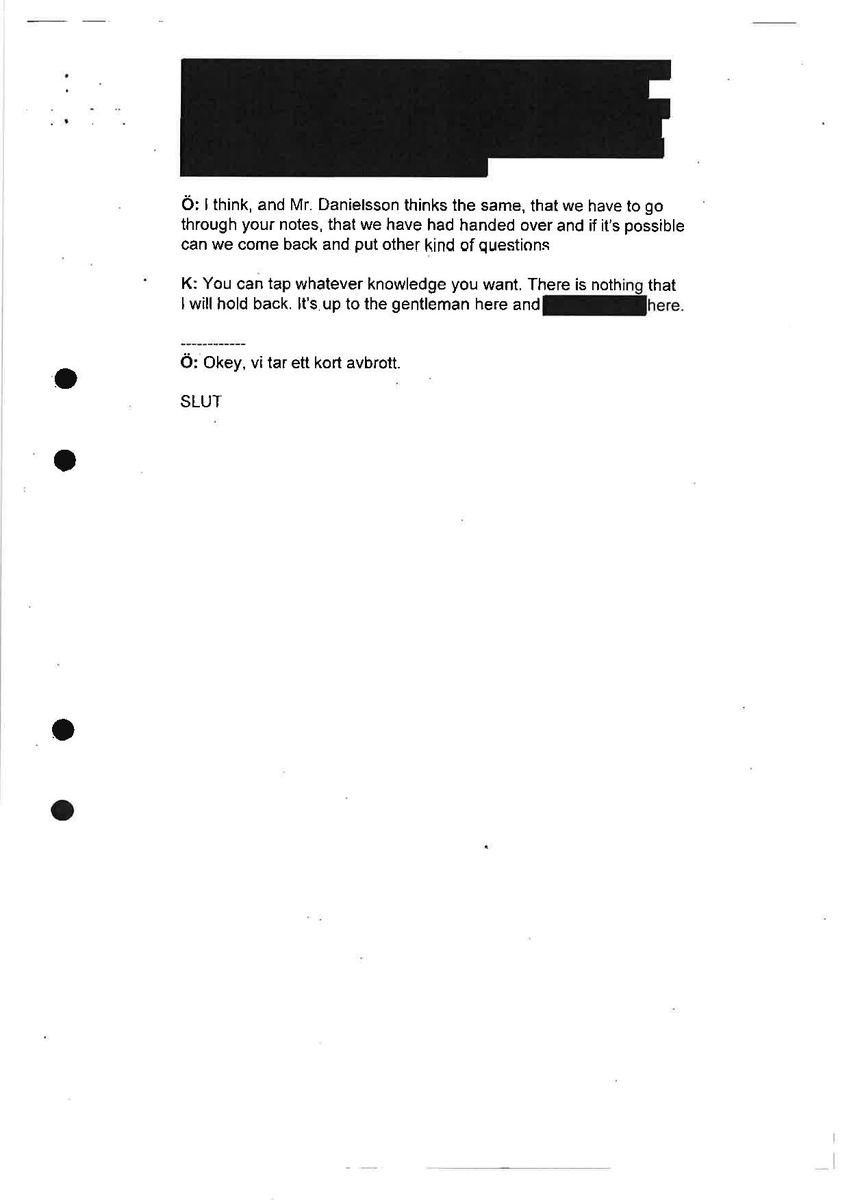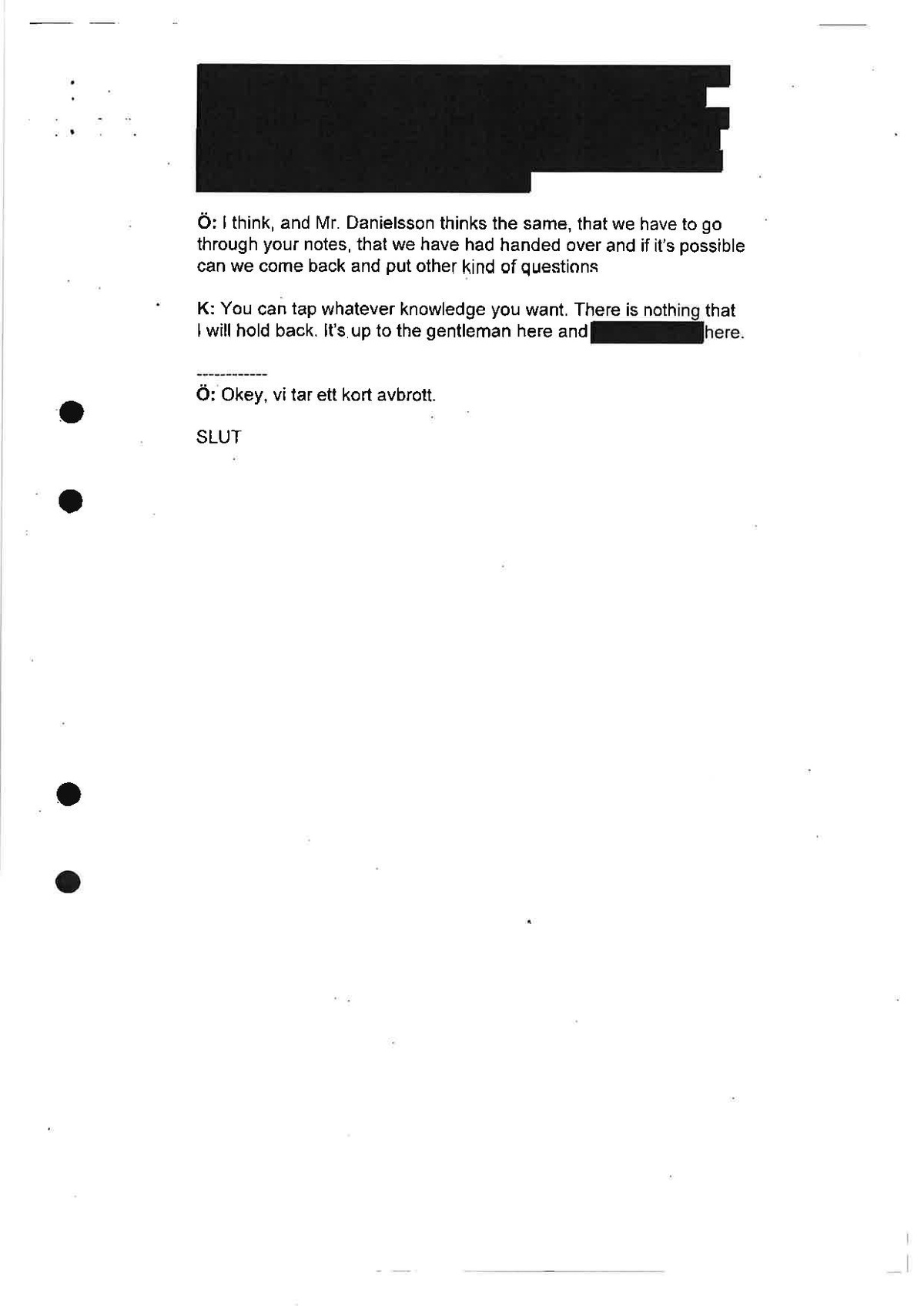Uppslag i samma avsnitt:
Promemoria avseende förhör med Eugene de Kock 1996-10-10
Bakgrund: Förhör inspelat på kasettband och därefter utskrivet på diskett av ambassadpersonal i Sydafrika,
Mitt uppdrag: Kontrollera att utskriften korresponderar mot det inspelade bandet.
Min slutsats: Det utskrivna förhöret, avseende reell fakta, korresponderar väl mot ljudinspelningen.
Min åtgärd: Jag har gjort redaktionella korrigeringar avseende rent faktamässiga bitar, såsom stavning på egennamn.
Synpunkt: Man kan konstatera att den som gjort grundutskriften från kasettbandet har filtrerat/selekterat bort ovidkommande hummanden, påbörjade men ej avslutade meningar samt i vissa fall med små medel korrigerat meningsbyggnad och ordföljd. Syftet har säkerligen varit att få en mer lättläst text.
Enligt mitt sätt att tolka det innehållsmässiga har dock inte det substantiella avseende reell fakta reducerats eller nämnvärt påverkats.
Kasettband med originalinspelning bifogas förhöret.
Stockholm 1996-11-15
Tuve Johansson
Rikskriminalpolisen
Diskett förvaras godsrum i plastbox märkt "SYDAFRIKA" /PK
Kassettband ej med detta PM /PK
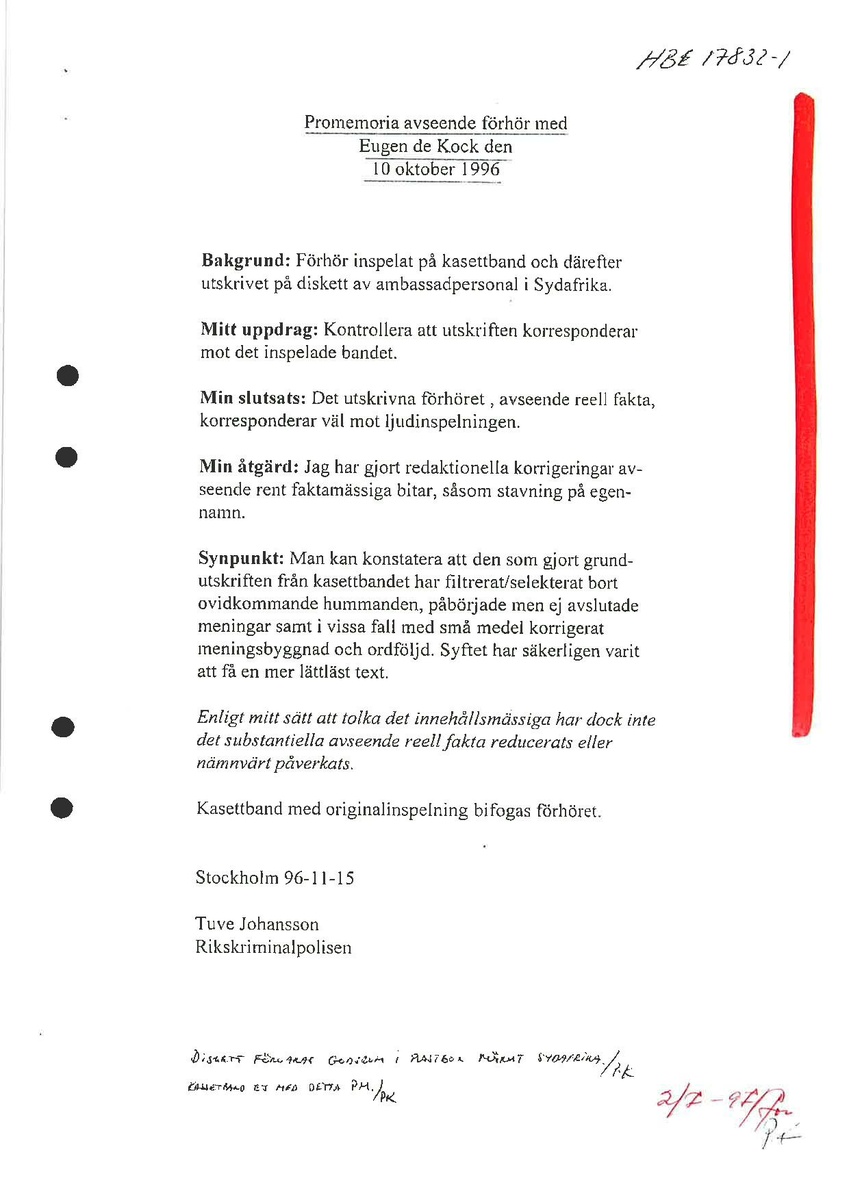
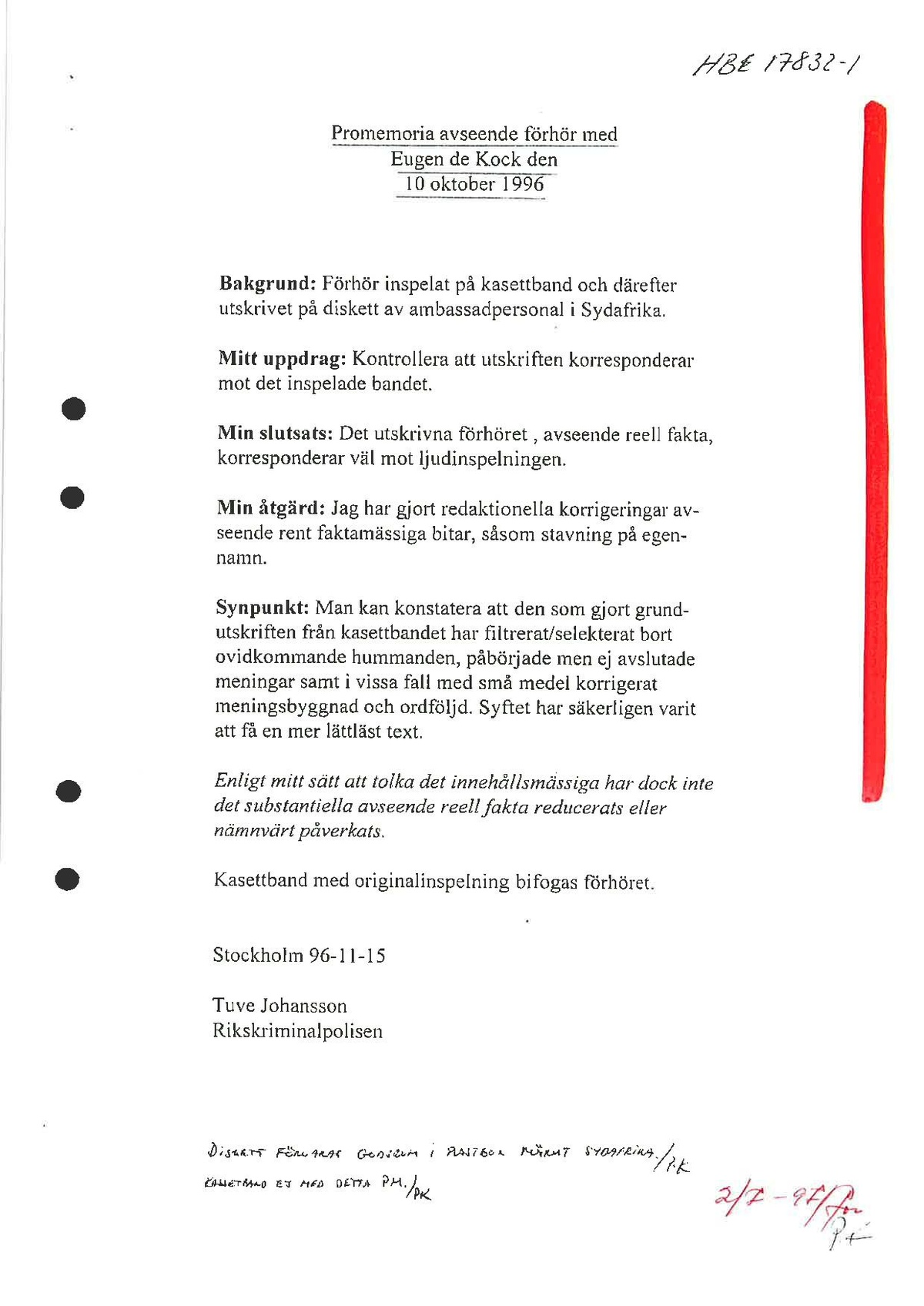
Promemoria avseende förhör med Eugene de Kock 1996-10-10
Bakgrund: Förhör inspelat på kasettband och därefter utskrivet på diskett av ambassadpersonal i Sydafrika,
Mitt uppdrag: Kontrollera att utskriften korresponderar mot det inspelade bandet.
Min slutsats: Det utskrivna förhöret, avseende reell fakta, korresponderar väl mot ljudinspelningen.
Min åtgärd: Jag har gjort redaktionella korrigeringar avseende rent faktamässiga bitar, såsom stavning på egennamn.
Synpunkt: Man kan konstatera att den som gjort grundutskriften från kasettbandet har filtrerat/selekterat bort ovidkommande hummanden, påbörjade men ej avslutade meningar samt i vissa fall med små medel korrigerat meningsbyggnad och ordföljd. Syftet har säkerligen varit att få en mer lättläst text.
Enligt mitt sätt att tolka det innehållsmässiga har dock inte det substantiella avseende reell fakta reducerats eller nämnvärt påverkats.
Kasettband med originalinspelning bifogas förhöret.
Stockholm 1996-11-15
Tuve Johansson
Rikskriminalpolisen
Diskett förvaras godsrum i plastbox märkt "SYDAFRIKA" /PK
Kassettband ej med detta PM /PK
- - 10 (12) -
Eugene de Kock: No, no he did not, except that he was a former intelligence officer and also a Swedish intelligence officer.
I had no other indication of what the man is even doing in Turkey now.
You know, I don't suppose you just sit in Turkey for the rest of your life. I suppose you must be doing something, but I didn't ask him that.
I didn't ask him to what line of service he is now or if he is running a business or whatever.
FHL Hans Ölvebro: Can you give us more information about the kind of name, I mean if you can say if it's typical British or Italian?
Eugene de Kock: No, it was definitely a Scandinavian. I won't say Swedish, but it's definitely Scandinavian.
For the purpose, you must please take it; I am not joking, there are many of your surnames, which is quite unpronouncable to us. I think you have the same problem with some of ours.
But it was not a difficult Swedish name. It was not a difficult Swedish name. It was something that I would be able to pronounce, but I do not make a connection with this Widén. Bertil Wedin
ÅKL Jan Danielsson: Could it have been Namn maskerat
............
Eugene de Kock:: I don't want to speculate. I am going to do a summary of this survice if I speculate.
I would really, I can not tell you since I was in might the statement I've wrapped my brain and even before because I was going to make a statement, so that I could provide and get it on record in court, for the purpose of court.
There is no doubt, now that Philip Powell has intimate knowledge of this information and of the operations in South Africa.
Look, I've been in this line of work since 1978. You usually have a shelf life of four to five years. I lasted until 1993, just before certain gentlemen end decided otherwise and put a stop to it, a good think I think also.
You threw discussion on a lot of questioning I've done, soft interrogation, hard interrogation.
I've talked to a lot of people.
There was no stress with when he was talking to me. It came easy, it came as I would say, you know, well, can you remember either that man we caught for murder in springs in 1969, oh yes, it's so and so.
There was no hesitation, there was no blank, there was no search of memory, not at all.
And I am quite prepared at any stage to have Philip Powell there, attached to a polygraph machine and also here attached to a polygraph machine. You could ask us the same questions.
I would actually prefere it. And use a voice (unstresser?) at the same time. Because I know that I am not going to lose.
He is the one that is going to lose out. He knows .. I am not doing this to make things, you know, difficult for him. I am going to be trying to solve the matter here and that's it.
ÅKL Jan Danielsson: May I ask you like this, although I think that you have answered the question already in a way. Can you think of any means that would make Philip Powell come forward and tell us what you have told us?
Eugene de Kock: Say yes, and strangely enough I also told Namn Maskerat this although he did not seem to take it in. I said to him, that; if Philip Powell is charged
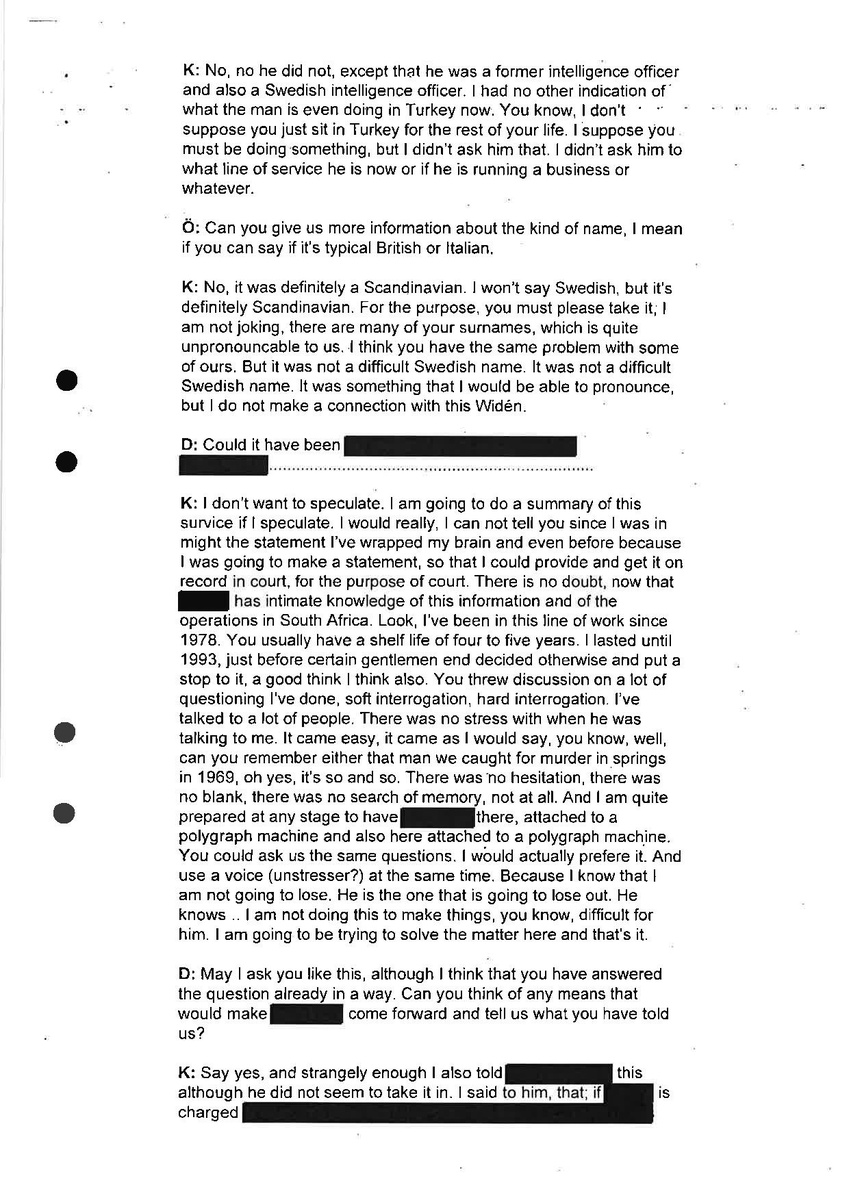
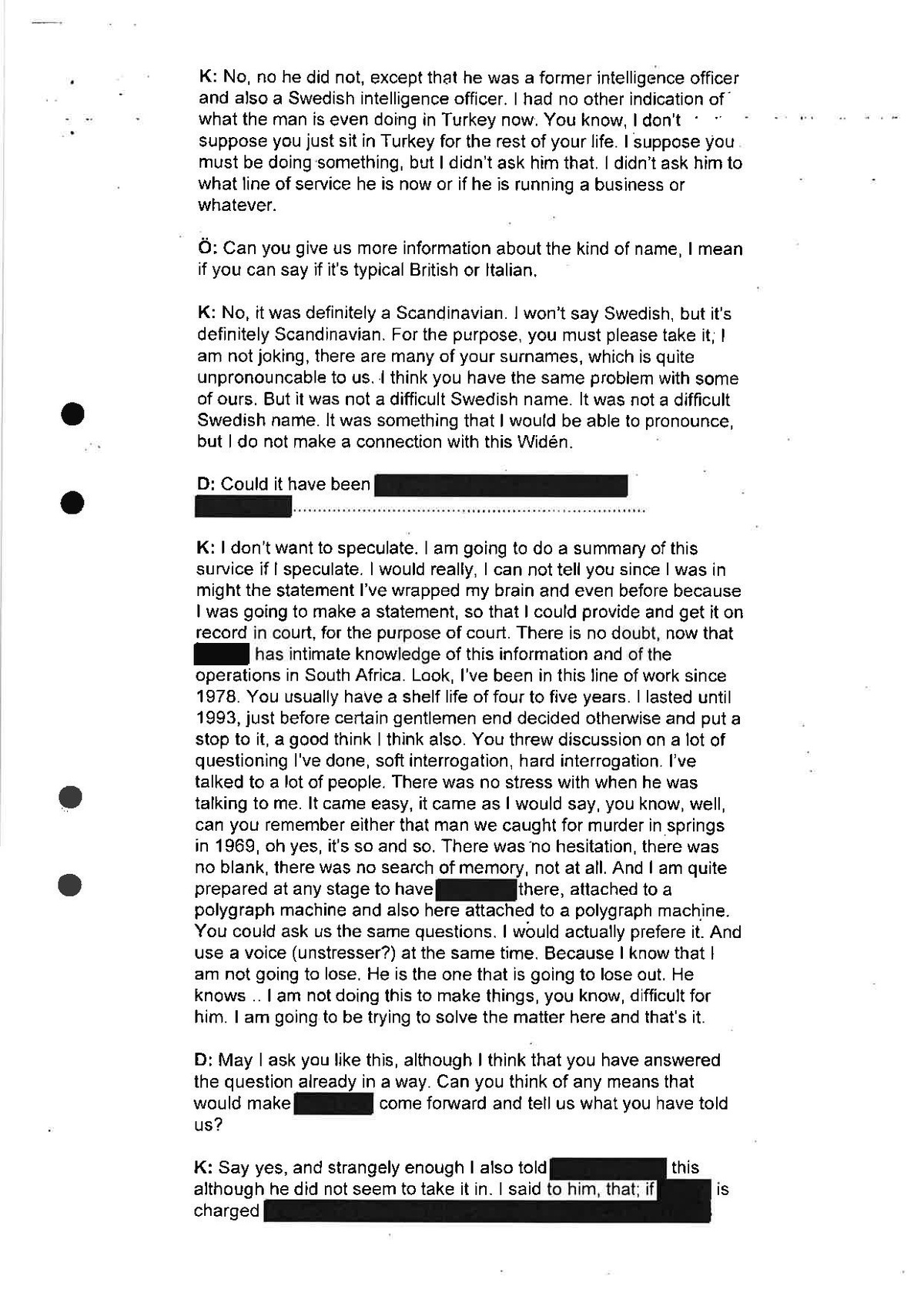
- - 10 (12) -
Eugene de Kock: No, no he did not, except that he was a former intelligence officer and also a Swedish intelligence officer.
I had no other indication of what the man is even doing in Turkey now.
You know, I don't suppose you just sit in Turkey for the rest of your life. I suppose you must be doing something, but I didn't ask him that.
I didn't ask him to what line of service he is now or if he is running a business or whatever.
FHL Hans Ölvebro: Can you give us more information about the kind of name, I mean if you can say if it's typical British or Italian?
Eugene de Kock: No, it was definitely a Scandinavian. I won't say Swedish, but it's definitely Scandinavian.
For the purpose, you must please take it; I am not joking, there are many of your surnames, which is quite unpronouncable to us. I think you have the same problem with some of ours.
But it was not a difficult Swedish name. It was not a difficult Swedish name. It was something that I would be able to pronounce, but I do not make a connection with this Widén. Bertil Wedin
ÅKL Jan Danielsson: Could it have been Namn maskerat
............
Eugene de Kock:: I don't want to speculate. I am going to do a summary of this survice if I speculate.
I would really, I can not tell you since I was in might the statement I've wrapped my brain and even before because I was going to make a statement, so that I could provide and get it on record in court, for the purpose of court.
There is no doubt, now that Philip Powell has intimate knowledge of this information and of the operations in South Africa.
Look, I've been in this line of work since 1978. You usually have a shelf life of four to five years. I lasted until 1993, just before certain gentlemen end decided otherwise and put a stop to it, a good think I think also.
You threw discussion on a lot of questioning I've done, soft interrogation, hard interrogation.
I've talked to a lot of people.
There was no stress with when he was talking to me. It came easy, it came as I would say, you know, well, can you remember either that man we caught for murder in springs in 1969, oh yes, it's so and so.
There was no hesitation, there was no blank, there was no search of memory, not at all.
And I am quite prepared at any stage to have Philip Powell there, attached to a polygraph machine and also here attached to a polygraph machine. You could ask us the same questions.
I would actually prefere it. And use a voice (unstresser?) at the same time. Because I know that I am not going to lose.
He is the one that is going to lose out. He knows .. I am not doing this to make things, you know, difficult for him. I am going to be trying to solve the matter here and that's it.
ÅKL Jan Danielsson: May I ask you like this, although I think that you have answered the question already in a way. Can you think of any means that would make Philip Powell come forward and tell us what you have told us?
Eugene de Kock: Say yes, and strangely enough I also told Namn Maskerat this although he did not seem to take it in. I said to him, that; if Philip Powell is charged
- - 11 (12) -
Eugene de Kock: and ammunition, which was obviously ?, and he could be made to stand trial, and the president of this country is prepared to give him amnesty just in a change for the name and address I think he would except it.
If he still continues with it, then there must be a very good reason or there must be something which is threatening, not him, but somebody else who is close to him or something like that.
But I made certain notes here for you people to look at, which I would have done if I were in your shoes.
I have never been in Scandinavia. I don't know what powers you have, how your constitution works, except that it works. Helt stycke maskerat
Helt stycke maskerat
ÅKL Jan Danielsson: Is that the knowledge you have, that he wasn't the gunman?
Eugene de Kock: Helt stycke maskerat
ÅKL Jan Danielsson: It's a conclusion you make?
Eugene de Kock: Helt stycke maskerat . I have no doubt that there must have been a formal surveillance.
If it wasn't surveillance, there must have been a leakage from within the household or whatever.
If it wasn't a leakage then it might have been a penetration of the household, wife, a love affair or whatever. I've made quite substancial notes. But that is conclusions.
Helt stycke maskerat
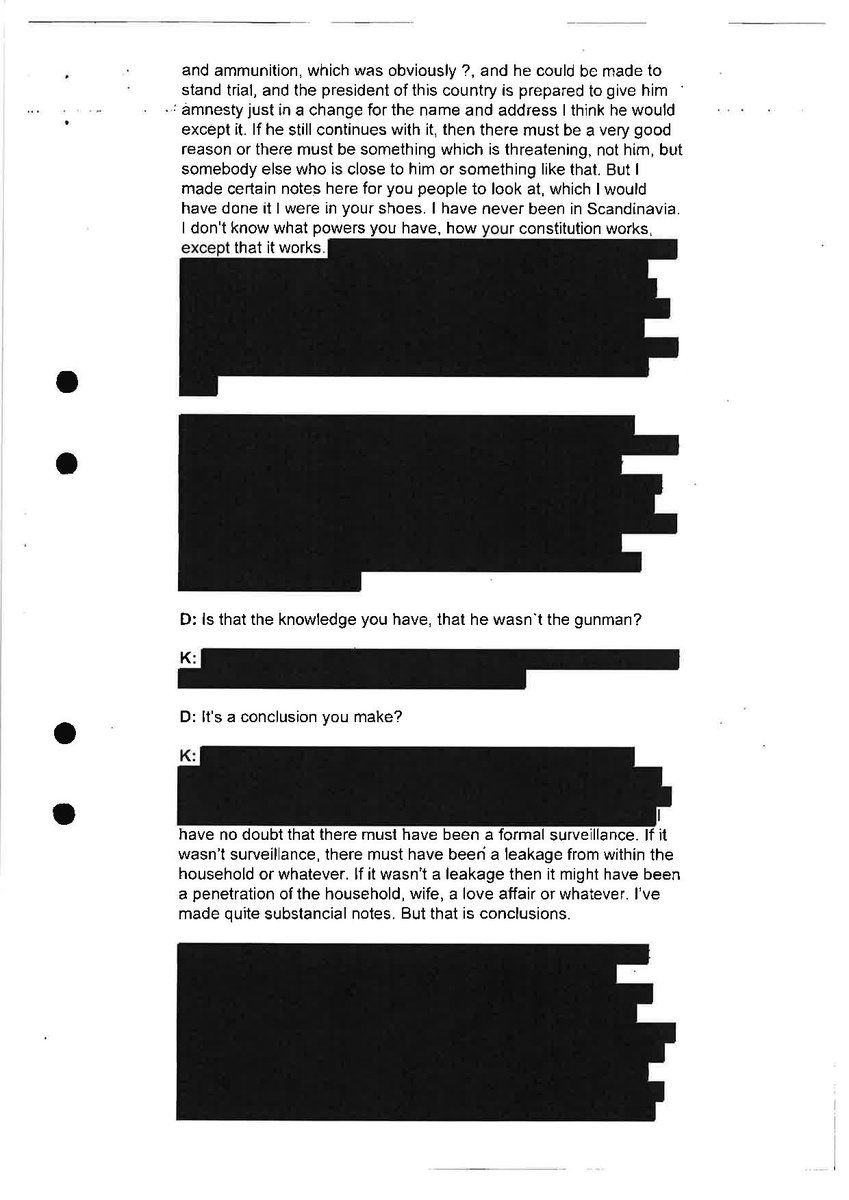
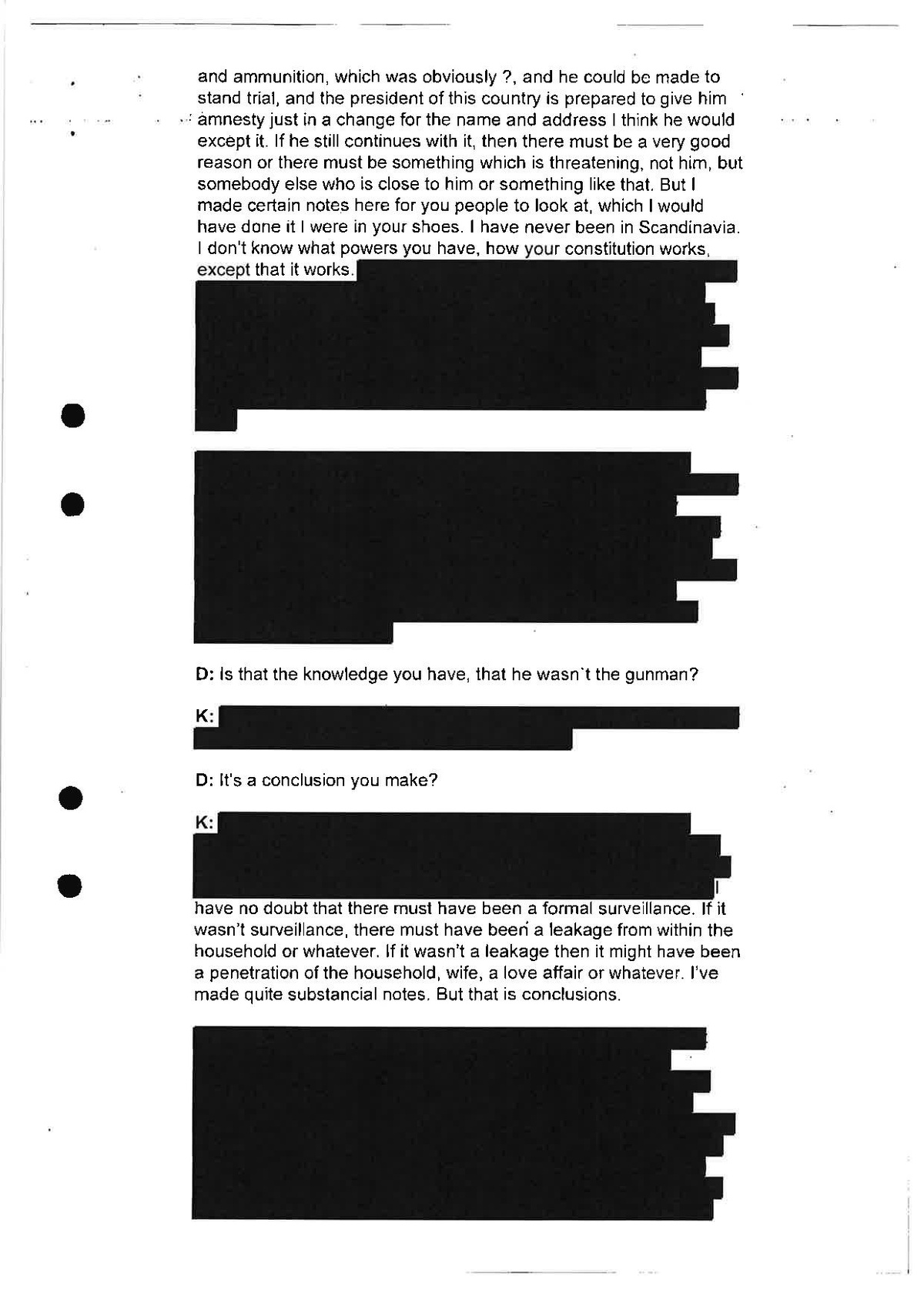
- - 11 (12) -
Eugene de Kock: and ammunition, which was obviously ?, and he could be made to stand trial, and the president of this country is prepared to give him amnesty just in a change for the name and address I think he would except it.
If he still continues with it, then there must be a very good reason or there must be something which is threatening, not him, but somebody else who is close to him or something like that.
But I made certain notes here for you people to look at, which I would have done if I were in your shoes.
I have never been in Scandinavia. I don't know what powers you have, how your constitution works, except that it works. Helt stycke maskerat
Helt stycke maskerat
ÅKL Jan Danielsson: Is that the knowledge you have, that he wasn't the gunman?
Eugene de Kock: Helt stycke maskerat
ÅKL Jan Danielsson: It's a conclusion you make?
Eugene de Kock: Helt stycke maskerat . I have no doubt that there must have been a formal surveillance.
If it wasn't surveillance, there must have been a leakage from within the household or whatever.
If it wasn't a leakage then it might have been a penetration of the household, wife, a love affair or whatever. I've made quite substancial notes. But that is conclusions.
Helt stycke maskerat
- - 12 (12) -
Eugene de Kock: Helt stycke maskerat
FHL Hans Ölvebro: I think, and Mr. Jan Danielsson thinks the same, that we have to go through your notes, that we have had handed over and if it's possible can we come back and put other kind of questions.
Eugene de Kock: You can tap whatever knowledge you want. There is nothing that I will hold back. It's up to the gentleman here and Namn maskerat here.
FHL Hans Ölvebro: Okey, vi tar ett kort avbrott.
SLUT
- - 12 (12) -
Eugene de Kock: Helt stycke maskerat
FHL Hans Ölvebro: I think, and Mr. Jan Danielsson thinks the same, that we have to go through your notes, that we have had handed over and if it's possible can we come back and put other kind of questions.
Eugene de Kock: You can tap whatever knowledge you want. There is nothing that I will hold back. It's up to the gentleman here and Namn maskerat here.
FHL Hans Ölvebro: Okey, vi tar ett kort avbrott.
SLUT
- - 2 (12) -
Eugene de Kock: In October 1993 Philip Powell gave me the name of a man, which I now will call the shooter. He was the man involved in killing Olof Palme, he was the man who fired the shot.
Unfortunately I don't .. have his name at this stage, it was in my book which I managed to recover before they destroyed it.
The name basically, if I think back does not coincide with that of Bertil Wedin , the sound doesn't make sense.
What Philip Powell make very very clear was that this man was a Swedish intelligent officer, there was talk about a commissioned officer and I have a vague recollection that he was a captain.
It was a very open short relation with myself and Philip Powell . There was a lot of trust between the two of us.
- so there was a very close relationship at that stage between us.
He gave me this information that if I ever will travel to Turkey and I want to look up this man or I need his help or if I want to go and visit him I was welcome to do so and he gave me the name of the man and his postbox number. It was a street number, there was a telephone number and it was not something like Cyprus or northern Cyprus, it was in Turkey itself. That is how he gave it to me.
To give you a background of {{Maskat|Text=[[Philip Powell}} is that he worked for the South African Police Intelligence Unit , which was called Stratcom, which stands for strategic communications, which was involved in counter propaganda and also, in more or less, dirty tricks.
He then left the South African Police Force and joined the front company, Military Intelligence, that was known as Longreach, was a project of the army.
The grouping that it was allocated to was DCI, that is Directorate of Coded Intelligence, or Coded Information. I know that specific unit very well because we were cooperating at various stages.
There was also a second body, which was International Freedom Foundation, which was also a project of DCI and it also dovetailed of operation Longreach. Craig Williamson was the chief of Longreach, I don't know who the other persons were Helt stycke maskerat
After the closing of Longreach, DCI was quite in a terse, because
, which, still today, they couldn't find. That is just by the way ..
The International Freedom Foundation, in charge there was Namn maskerat , also then a military intelligence operator.
They have changed their name in 1994, after my arrest, to Executive Research Associate or Agency, ERA. They sell information, you corporative information concerning companies investments, which they sell to corporations or to other countries, which are interesting in investing. There was a very, very strong American link.
ÅKL Jan Danielsson: Maybe we should say that Mr Eugene De Kock is referring to a written document, which he has in his hand.
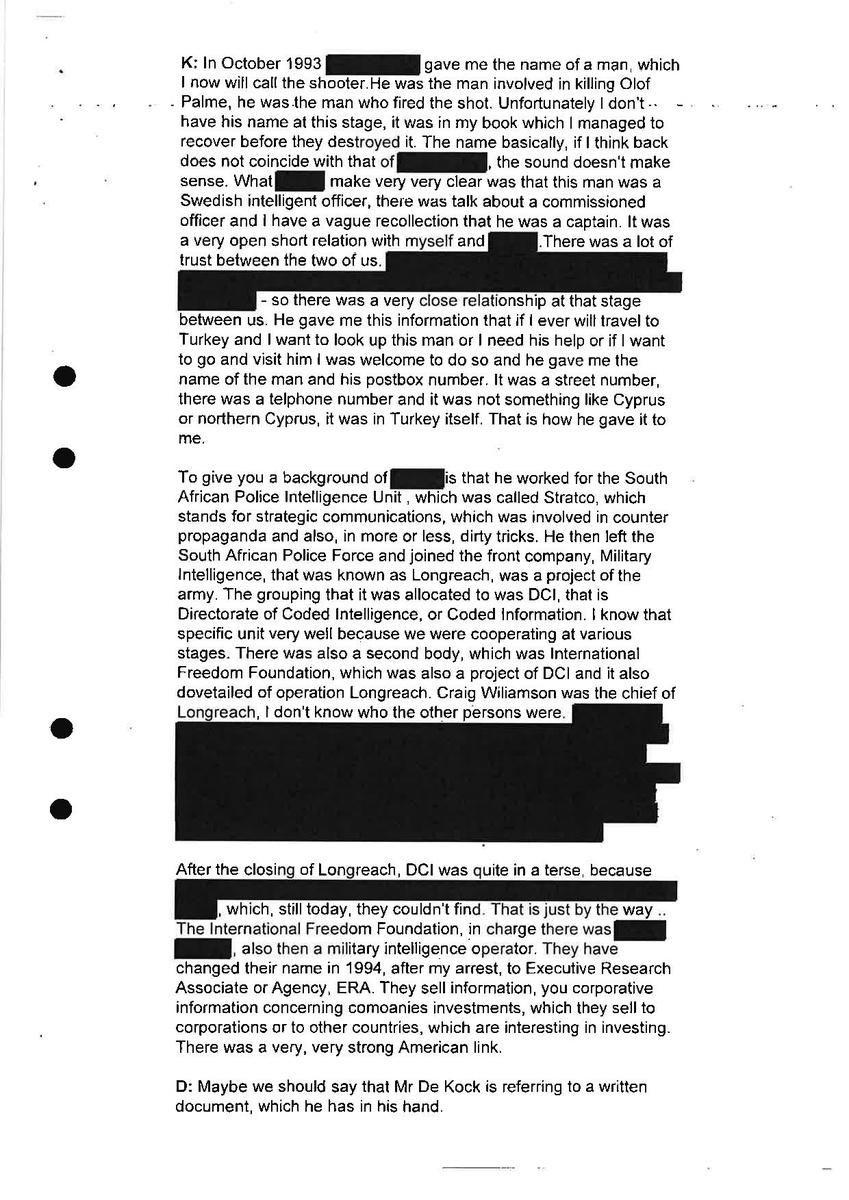
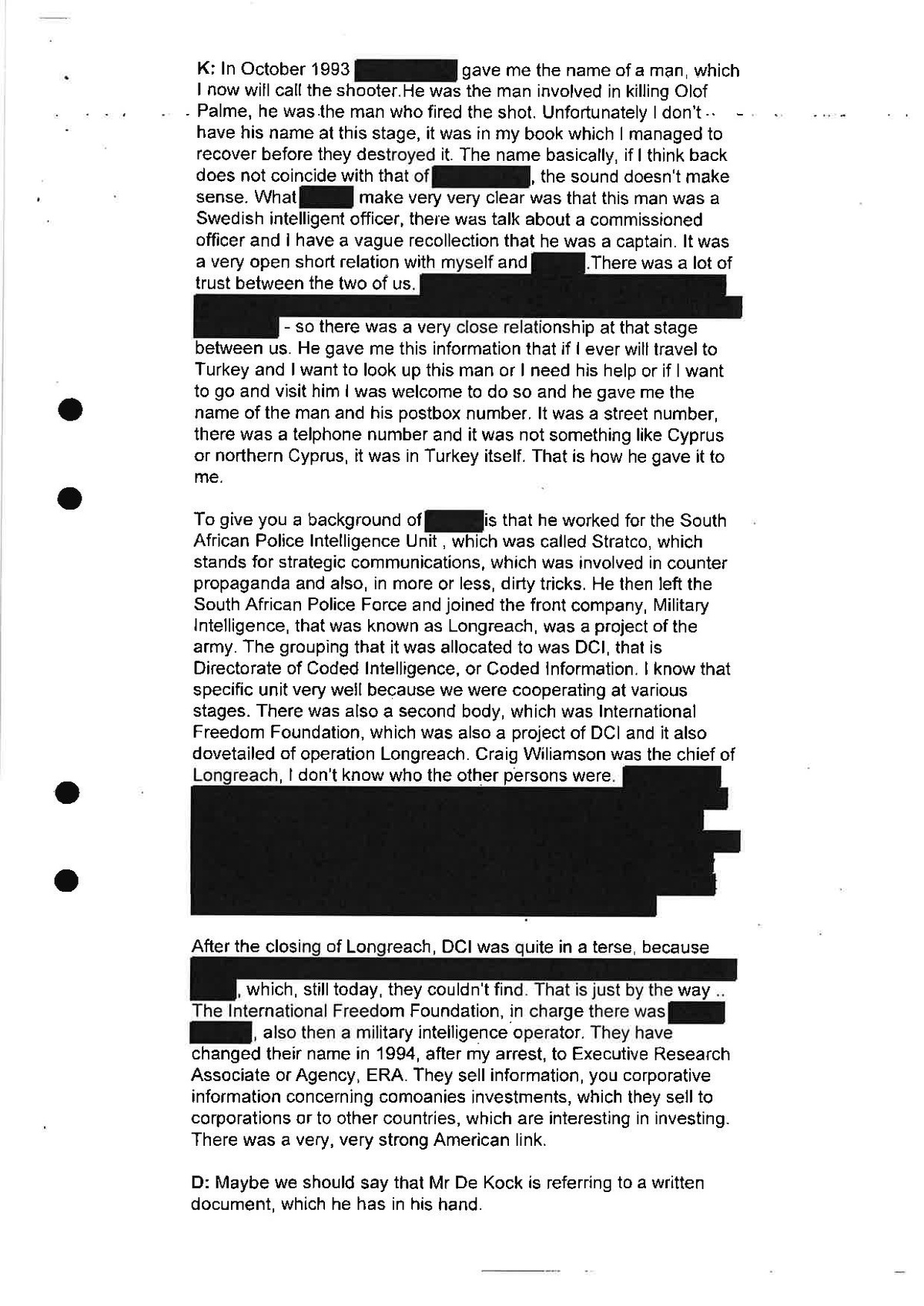
- - 2 (12) -
Eugene de Kock: In October 1993 Philip Powell gave me the name of a man, which I now will call the shooter. He was the man involved in killing Olof Palme, he was the man who fired the shot.
Unfortunately I don't .. have his name at this stage, it was in my book which I managed to recover before they destroyed it.
The name basically, if I think back does not coincide with that of Bertil Wedin , the sound doesn't make sense.
What Philip Powell make very very clear was that this man was a Swedish intelligent officer, there was talk about a commissioned officer and I have a vague recollection that he was a captain.
It was a very open short relation with myself and Philip Powell . There was a lot of trust between the two of us.
- so there was a very close relationship at that stage between us.
He gave me this information that if I ever will travel to Turkey and I want to look up this man or I need his help or if I want to go and visit him I was welcome to do so and he gave me the name of the man and his postbox number. It was a street number, there was a telephone number and it was not something like Cyprus or northern Cyprus, it was in Turkey itself. That is how he gave it to me.
To give you a background of {{Maskat|Text=[[Philip Powell}} is that he worked for the South African Police Intelligence Unit , which was called Stratcom, which stands for strategic communications, which was involved in counter propaganda and also, in more or less, dirty tricks.
He then left the South African Police Force and joined the front company, Military Intelligence, that was known as Longreach, was a project of the army.
The grouping that it was allocated to was DCI, that is Directorate of Coded Intelligence, or Coded Information. I know that specific unit very well because we were cooperating at various stages.
There was also a second body, which was International Freedom Foundation, which was also a project of DCI and it also dovetailed of operation Longreach. Craig Williamson was the chief of Longreach, I don't know who the other persons were Helt stycke maskerat
After the closing of Longreach, DCI was quite in a terse, because
, which, still today, they couldn't find. That is just by the way ..
The International Freedom Foundation, in charge there was Namn maskerat , also then a military intelligence operator.
They have changed their name in 1994, after my arrest, to Executive Research Associate or Agency, ERA. They sell information, you corporative information concerning companies investments, which they sell to corporations or to other countries, which are interesting in investing. There was a very, very strong American link.
ÅKL Jan Danielsson: Maybe we should say that Mr Eugene De Kock is referring to a written document, which he has in his hand.
- - 3 (12) -
Eugene de Kock: I do it for the sake of completion. I dont want to jump around. I do it all in sequence so as to benefitfit yourself and to save time.
FHL Hans Ölvebro: And the copy has been handled over to us.
Eugene de Kock: Yes, I don't have problem with that. It has been over to you. If you want the original, you are also welcome. You can keep a copy and then you have it in handwriting as well.
FHL Hans Ölvebro: You were starting to talk about the American connection.
Eugene de Kock: Philip Powell made it very clear that there was a very strong American connection between the International Freedom Foundation as well as with a Longreach company a definite, or implied, or definite implied CIA connection. There is no doubt about it.
Philip Powell enjoyed a lot of a trust in this company where they operated in. I give you another example later.
He had to fly to Pakistan and pick up two or three of the chief mujadeens, or these leaders. And had to fly them into Huambo, which was their Unita head quarters in Angola.
And at the same time, and I believe it was a riganeer (?), (brigadier) at the same time they flew in the Contras and all the other South American, rightwing groups Sandinistas to whatever happened there.
There was so many little wars going on there. There was definitely a very very strong American connection concerning that.
OK, Philip Powell also mentioned to me, and this is to give you a back ground example of the openness that existed between us.
He and two or three other people operatives in this front company that he worked for, now live in England.
He also told me that on the Thames, one of those rivers in the central of London, well it is the Thames going through it in any case, there was a bust of Nelson Mandela, which was fabricated by some polymor? (polymer) . Or plastic material so it couldn't rust and they destroyed this, by throwing some liquid over and setting it alight.
And they were actually caught out. He never said who it was, if it was a special branch of MI5 or MI6. I don't think it would be MI6 in any case.
So they were operating, they were busy and they were in a destruction mood. Let me put it here that way.
FHL Hans Ölvebro: Can you tell us exactly what Philip Powell exactly told you about the murder of Mr Olof Palme.
Eugene de Kock: What he said is that this man is the man who shot Olof Palme, and that is it.
He never gave details how the man walked up or if he did walk up or if he was on a bike or if he was in a car or whatever.
Helt stycke maskerat
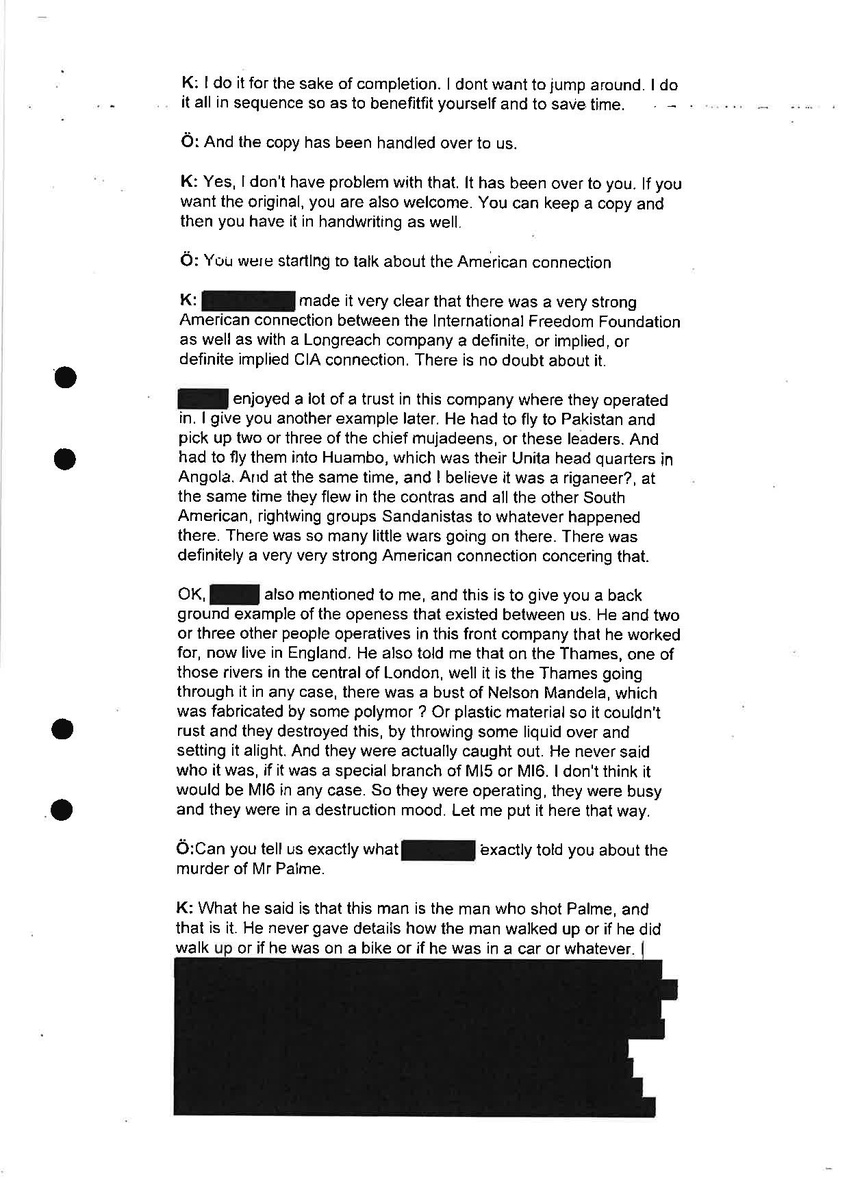
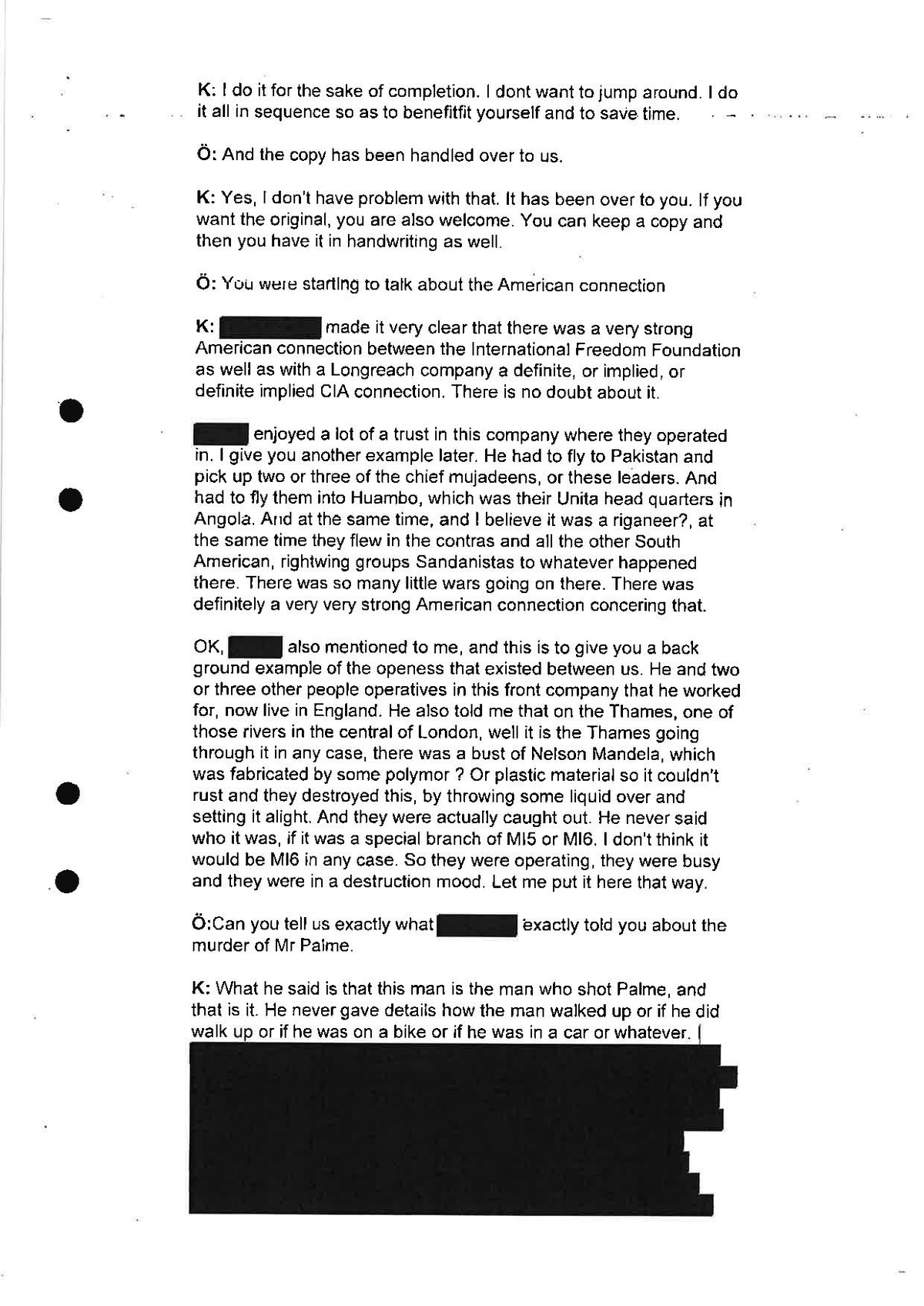
- - 3 (12) -
Eugene de Kock: I do it for the sake of completion. I dont want to jump around. I do it all in sequence so as to benefitfit yourself and to save time.
FHL Hans Ölvebro: And the copy has been handled over to us.
Eugene de Kock: Yes, I don't have problem with that. It has been over to you. If you want the original, you are also welcome. You can keep a copy and then you have it in handwriting as well.
FHL Hans Ölvebro: You were starting to talk about the American connection.
Eugene de Kock: Philip Powell made it very clear that there was a very strong American connection between the International Freedom Foundation as well as with a Longreach company a definite, or implied, or definite implied CIA connection. There is no doubt about it.
Philip Powell enjoyed a lot of a trust in this company where they operated in. I give you another example later.
He had to fly to Pakistan and pick up two or three of the chief mujadeens, or these leaders. And had to fly them into Huambo, which was their Unita head quarters in Angola.
And at the same time, and I believe it was a riganeer (?), (brigadier) at the same time they flew in the Contras and all the other South American, rightwing groups Sandinistas to whatever happened there.
There was so many little wars going on there. There was definitely a very very strong American connection concerning that.
OK, Philip Powell also mentioned to me, and this is to give you a back ground example of the openness that existed between us.
He and two or three other people operatives in this front company that he worked for, now live in England.
He also told me that on the Thames, one of those rivers in the central of London, well it is the Thames going through it in any case, there was a bust of Nelson Mandela, which was fabricated by some polymor? (polymer) . Or plastic material so it couldn't rust and they destroyed this, by throwing some liquid over and setting it alight.
And they were actually caught out. He never said who it was, if it was a special branch of MI5 or MI6. I don't think it would be MI6 in any case.
So they were operating, they were busy and they were in a destruction mood. Let me put it here that way.
FHL Hans Ölvebro: Can you tell us exactly what Philip Powell exactly told you about the murder of Mr Olof Palme.
Eugene de Kock: What he said is that this man is the man who shot Olof Palme, and that is it.
He never gave details how the man walked up or if he did walk up or if he was on a bike or if he was in a car or whatever.
Helt stycke maskerat
- - 4 (12) -
Helt stycke maskerat
Helt stycke maskerat
FHL Hans Ölvebro: Anything more direct about Palme?
ÅKL Jan Danielsson: Where did you talk to Philip Powell
Eugene de Kock: It was in the base camp, that was joining the game reserve, it was joining the Velozi/Felozi? game reserve. There is a base camp that is adjoining the fence of it.
We sat a night there and we talked and he then he gave me this information all by himself, it was not forced out of him.
I was actually surprised by his openess. I did not ask for this information. It came in normal conversations.
This was before we had an argument about his way of doing things when we started the training.
ÅKL Jan Danielsson: Do you remember the name of the camp?
Eugene de Kock: No and there is not a day that I am not kicking myself for not keeping it or keeping it back. I don't know how to explain it to you - not remorse but the stupidity of not keeping it. I had the name and I had...?
FHL Hans Ölvebro: Can you connect it with another event?
Eugene de Kock: I can maybe connect Philip Powell to another event, which happened, there is another name, which I will give to you which can give you another lead.
FHL Hans Ölvebro: When you talked to Philip Powell were you still in the camp?
Eugene de Kock: No, there is no other incidents that I can attach to it, which can give an additional, sort of projection of what happened there.
ÅKL Jan Danielsson: Where were you sitting?
Eugene de Kock: We were sitting just outside.
There was a long bungalow, built of stone with a thatched roof, if I am not mistaken. We were sitting outside there. That was where we slept and they also made the food there.
There is a little round bungalow, opposite of this long bungalow, it is also a shower and toilet facilities.
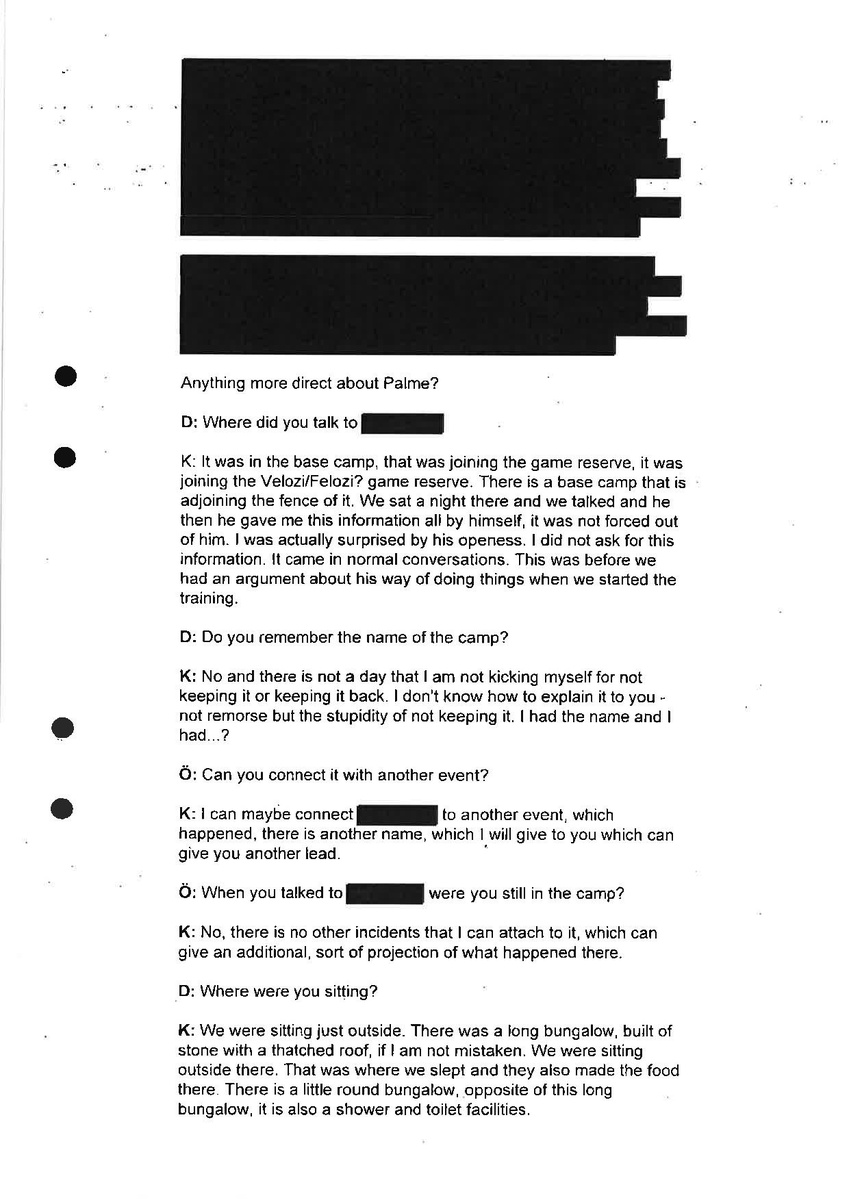
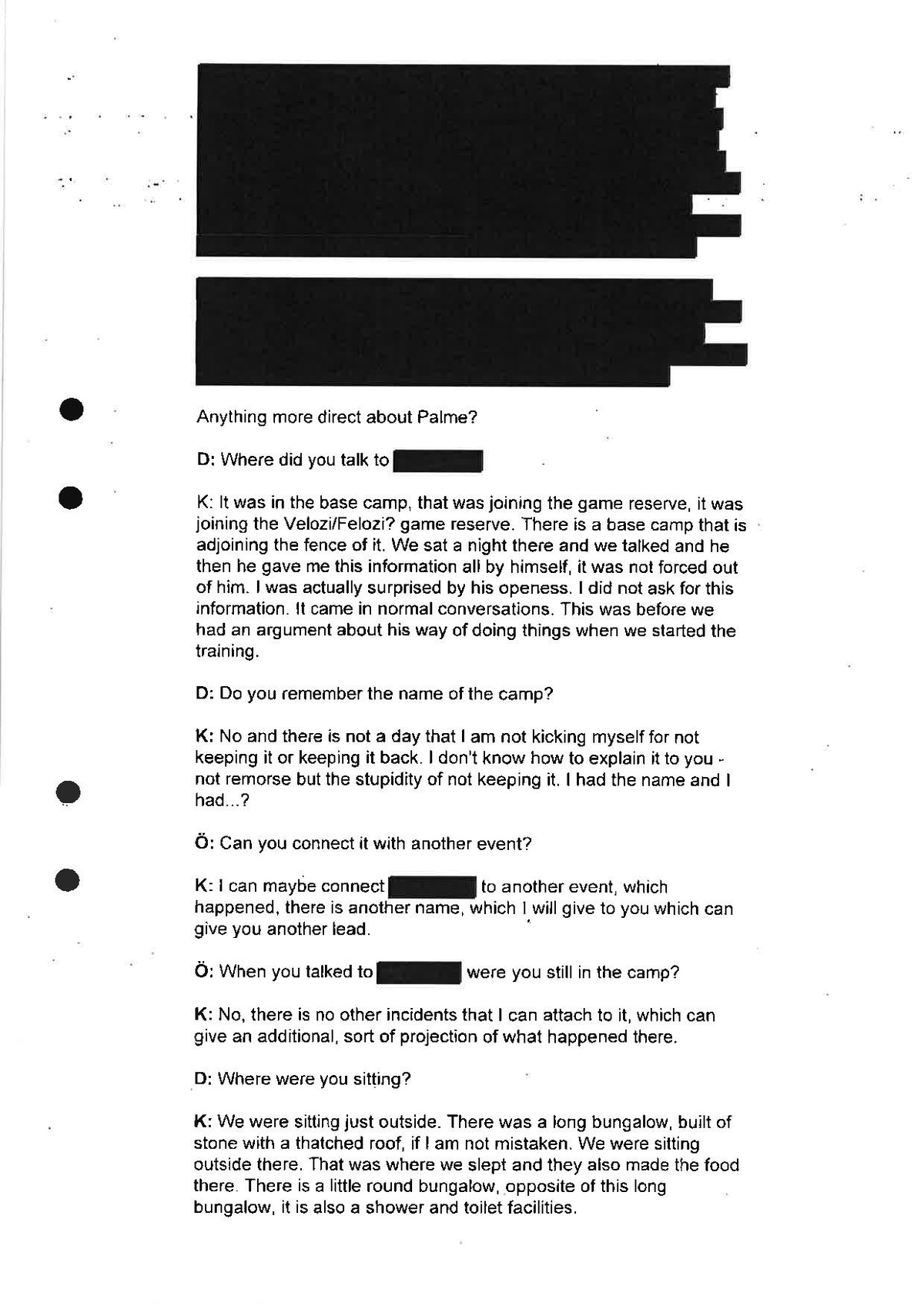
- - 4 (12) -
Helt stycke maskerat
Helt stycke maskerat
FHL Hans Ölvebro: Anything more direct about Palme?
ÅKL Jan Danielsson: Where did you talk to Philip Powell
Eugene de Kock: It was in the base camp, that was joining the game reserve, it was joining the Velozi/Felozi? game reserve. There is a base camp that is adjoining the fence of it.
We sat a night there and we talked and he then he gave me this information all by himself, it was not forced out of him.
I was actually surprised by his openess. I did not ask for this information. It came in normal conversations.
This was before we had an argument about his way of doing things when we started the training.
ÅKL Jan Danielsson: Do you remember the name of the camp?
Eugene de Kock: No and there is not a day that I am not kicking myself for not keeping it or keeping it back. I don't know how to explain it to you - not remorse but the stupidity of not keeping it. I had the name and I had...?
FHL Hans Ölvebro: Can you connect it with another event?
Eugene de Kock: I can maybe connect Philip Powell to another event, which happened, there is another name, which I will give to you which can give you another lead.
FHL Hans Ölvebro: When you talked to Philip Powell were you still in the camp?
Eugene de Kock: No, there is no other incidents that I can attach to it, which can give an additional, sort of projection of what happened there.
ÅKL Jan Danielsson: Where were you sitting?
Eugene de Kock: We were sitting just outside.
There was a long bungalow, built of stone with a thatched roof, if I am not mistaken. We were sitting outside there. That was where we slept and they also made the food there.
There is a little round bungalow, opposite of this long bungalow, it is also a shower and toilet facilities.
- - 5 (12) -
ÅKL Jan Danielsson: Anything else in the surrondings that you could remember?
Eugene de Kock: There was a lot of singing of the young blacks that were due to be trained, but nothing that would have impaired my hearing. There was no liqour. I don't use liqour 24 hours before I either start training or I go into operations. And he does not drink at all. So it is not a matter of that, he is a total abstainee, he doesn't use any alcohol at all.
ÅKL Jan Danielsson: Was it a long or short conversation?
Eugene de Kock: It was a general conversation, it sort of flowed, if I'm not mistaken I was referring to some of our operations in Swaziland, and because what I was trying to do was to compare the international standards of operations. I actually wanted to see .. will we also be able to operate in Europe, shoot at order come. And I had no doubt that we could, except for certain countries. You would have to be more careful and in certain countries I would not operate at all.
ÅKL Jan Danielsson: When you talked to Philip Powell did you talk to him about this matter for an hour or twenty minutes or several hours? And when did you start and when did you stop?
Eugene de Kock: It came in general conversation and it lasted about five, six minutes, it was more a reference and than a discussion of reference. I personally think that what he did here was do give me his CV. He was not known to me as an operator, Helt stycke maskerat
I think he was giving me his basic C.V. of his own back ground, his own knowledge to inspire me, to trust me.
ÅKL Jan Danielsson: I ask again. Can you remember how long this conversation lasted? Did you talk to him 5 minutes, 20 minutes, several hours.
Eugene de Kock: Look, the whole of the conversation, the general conversation, could have been up to half an hour to three quarters of an hour. That is if my recollection serves med correct.
Concerning the Olof Palme thing, which was a passing because it didn't basically interest me ... to put it that way, I had no compassion for Sweden at that time because of their stance against the South African government. Let's not make any mistake about that. But it did interest me from the point of view is that this jelous confirmation of the side.
ÅKL Jan Danielsson: Was anyone else present?
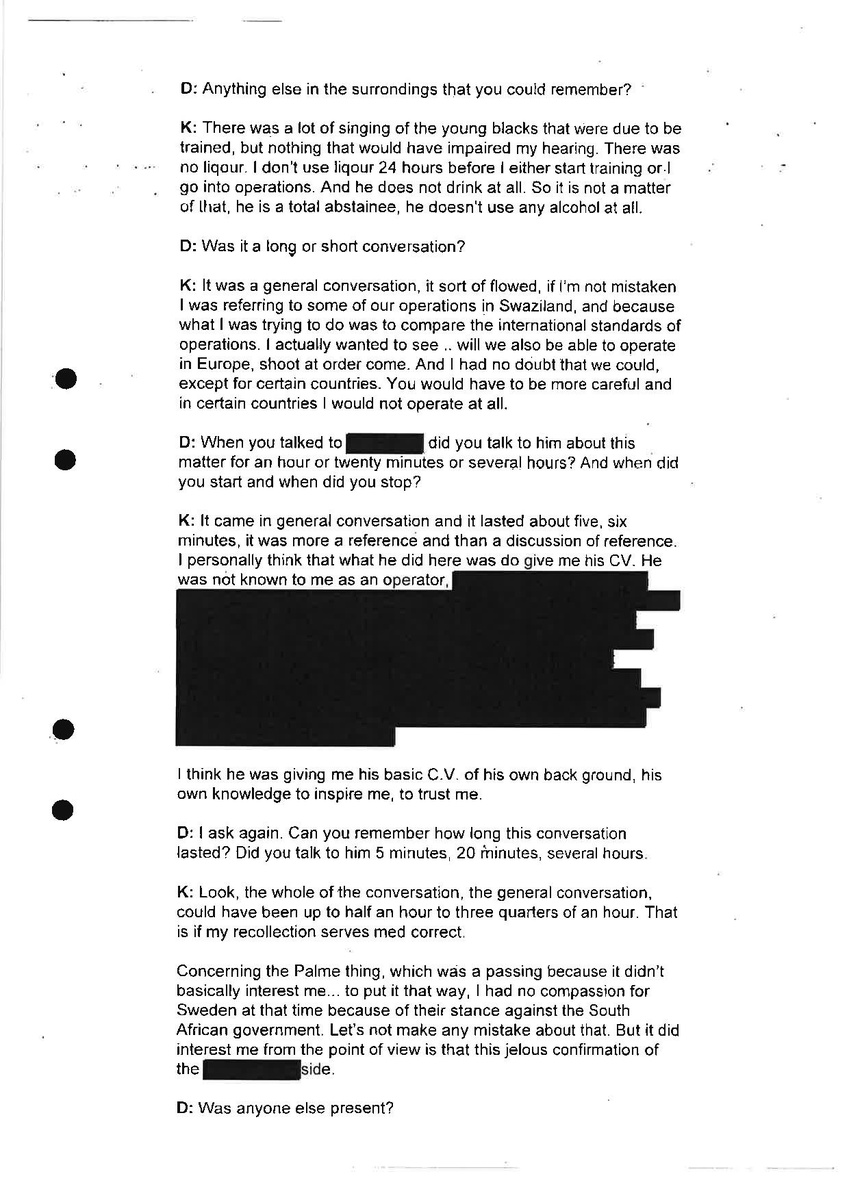
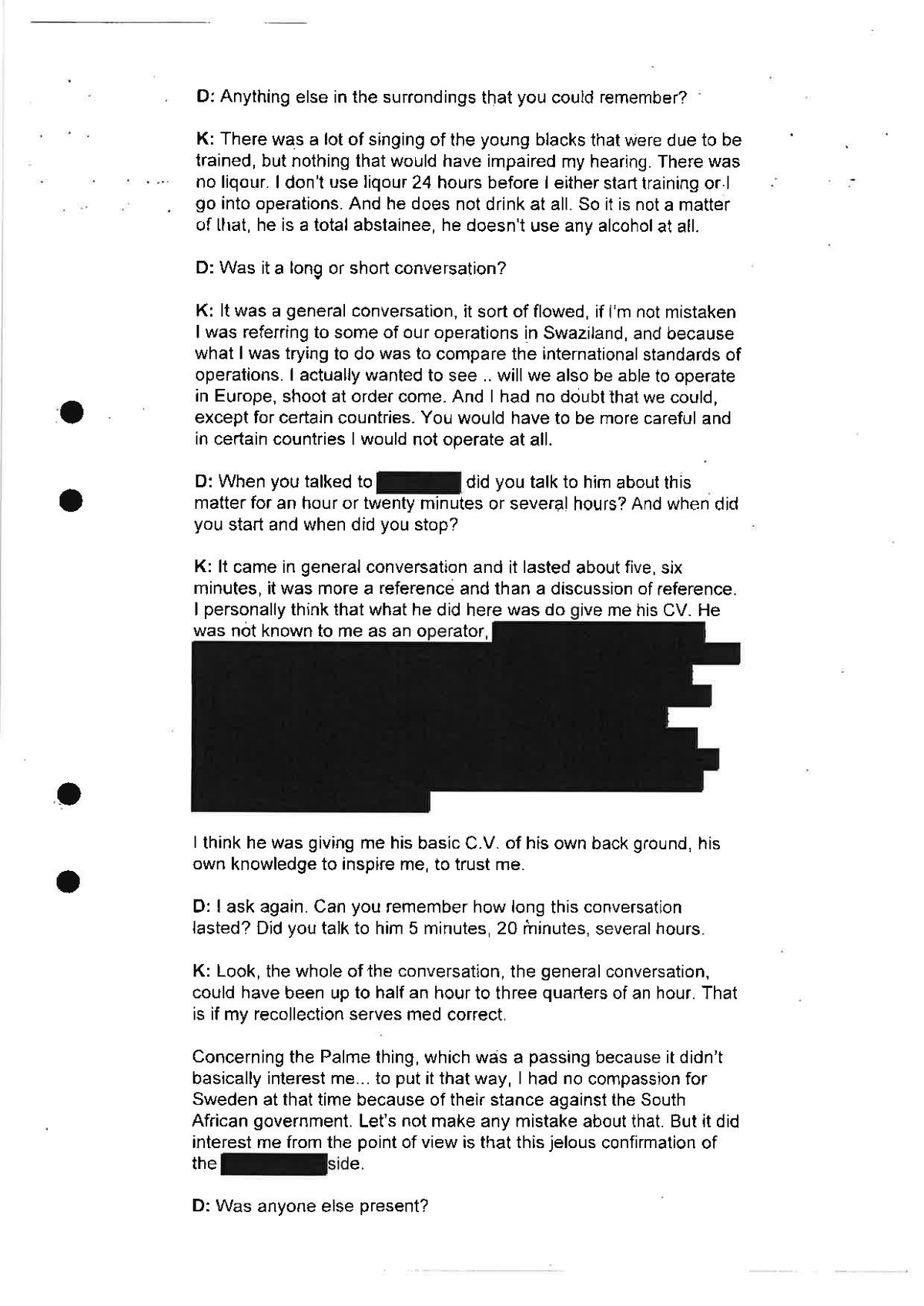
- - 5 (12) -
ÅKL Jan Danielsson: Anything else in the surrondings that you could remember?
Eugene de Kock: There was a lot of singing of the young blacks that were due to be trained, but nothing that would have impaired my hearing. There was no liqour. I don't use liqour 24 hours before I either start training or I go into operations. And he does not drink at all. So it is not a matter of that, he is a total abstainee, he doesn't use any alcohol at all.
ÅKL Jan Danielsson: Was it a long or short conversation?
Eugene de Kock: It was a general conversation, it sort of flowed, if I'm not mistaken I was referring to some of our operations in Swaziland, and because what I was trying to do was to compare the international standards of operations. I actually wanted to see .. will we also be able to operate in Europe, shoot at order come. And I had no doubt that we could, except for certain countries. You would have to be more careful and in certain countries I would not operate at all.
ÅKL Jan Danielsson: When you talked to Philip Powell did you talk to him about this matter for an hour or twenty minutes or several hours? And when did you start and when did you stop?
Eugene de Kock: It came in general conversation and it lasted about five, six minutes, it was more a reference and than a discussion of reference. I personally think that what he did here was do give me his CV. He was not known to me as an operator, Helt stycke maskerat
I think he was giving me his basic C.V. of his own back ground, his own knowledge to inspire me, to trust me.
ÅKL Jan Danielsson: I ask again. Can you remember how long this conversation lasted? Did you talk to him 5 minutes, 20 minutes, several hours.
Eugene de Kock: Look, the whole of the conversation, the general conversation, could have been up to half an hour to three quarters of an hour. That is if my recollection serves med correct.
Concerning the Olof Palme thing, which was a passing because it didn't basically interest me ... to put it that way, I had no compassion for Sweden at that time because of their stance against the South African government. Let's not make any mistake about that. But it did interest me from the point of view is that this jelous confirmation of the side.
ÅKL Jan Danielsson: Was anyone else present?
- - 6 (12) -
Eugene de Kock: No, it was only the two of us.
ÅKL Jan Danielsson: Has anyone else seen the two of you together at this time?
Eugene de Kock: I suppose there could have been a lot of the blacks that saw us together. But wether we will be able to identify them or not, there is eight or nine of those.
And even if they did see us we used to talk or walk away and then talk, the type of training that we kept amongst ourselves.
We sometimes might sit, you know, revelations about Buthelezi, which he gave to me on a personal basis: his health, his fear of witch doctors and things like that, which will be genuinly interested or all of interest to the general public. But this was personal conversations.
ÅKL Jan Danielsson: As you may know Philip Powell has denied that a conversation like this has taken place.
Eugene de Kock: Yes, I have seen that in newspapers.
ÅKL Jan Danielsson: Let's say that it has just slipped out of his mind. Is there anything special that can remind him that this conversation has happened.
Eugene de Kock: Yes, I think something that will remind him very strongly of that could be the name, because he gave it to me when I asked him who this man was, then he gave the name, you know, in this conversation and then he offered, he actually, without me asking him for it, he gave me the address and the telephone numbers, so if you are overseas or you go to Turkey, contact the man.
FHL Hans Ölvebro: Was he aware of this name in his mind?
Eugene de Kock: No, it is like I know the brigadier, it's like .. it is not that he is going to scratch around and look for names, it is like let's go and have a beer, you know it's, it is with ease, it is knowledge.
To come back to your previous question I want to answer that Oh, I think what will activate his memory very much is that he is sitting Helt stycke maskerat
Last year, on various occasions, I phoned him, and then if you look at my cell phone at that account, I'm phoning him in Cape Town on his cell phone.
I phoned him in parliament where he was sitting, asking what was going on. So, there was this openness amongst us.
Asking him on various occasions if he could give me that name again and he said, well, he can't do that now.
Then I phoned him about two, three months ago, and I said,
- "Listen, did you get me the name?"
And he said:
- "Listen, I don't know, I can't remember the name. But the people who know everything of the whole operation is a Helt stycke maskerat
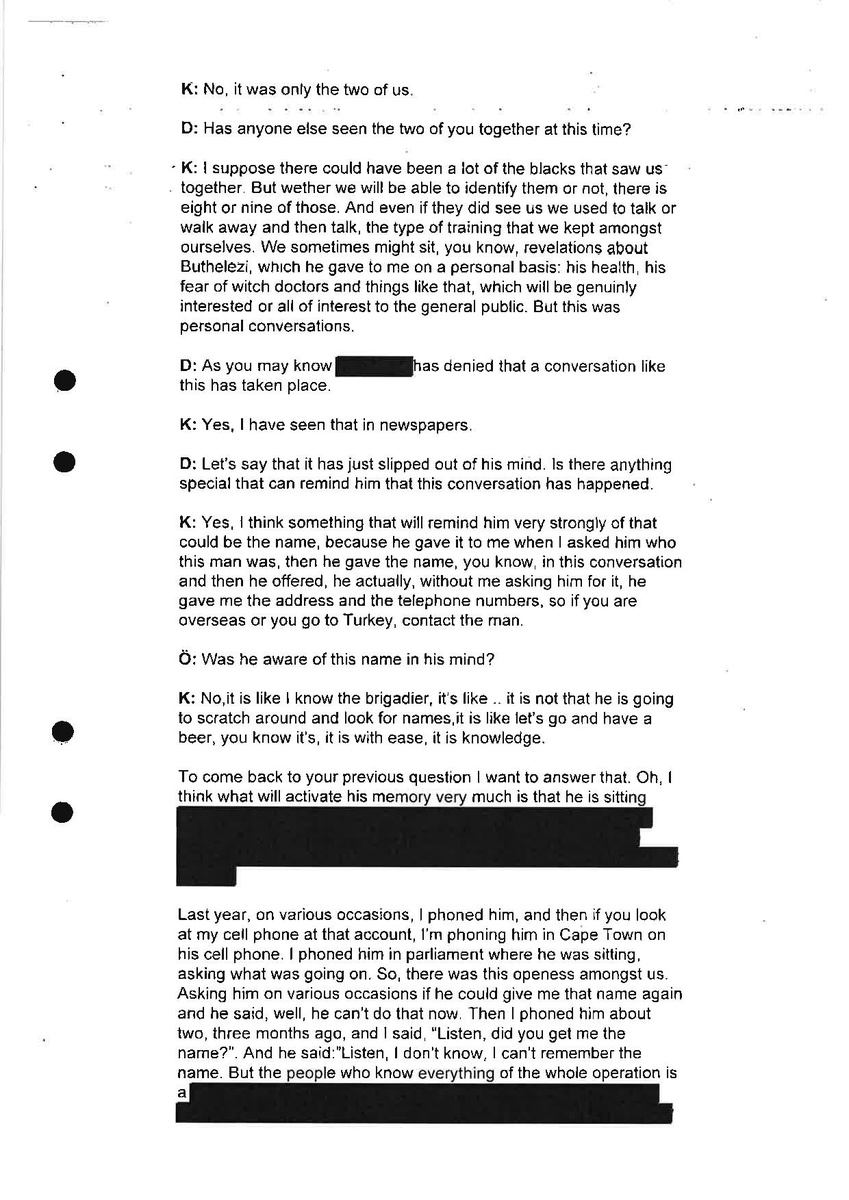
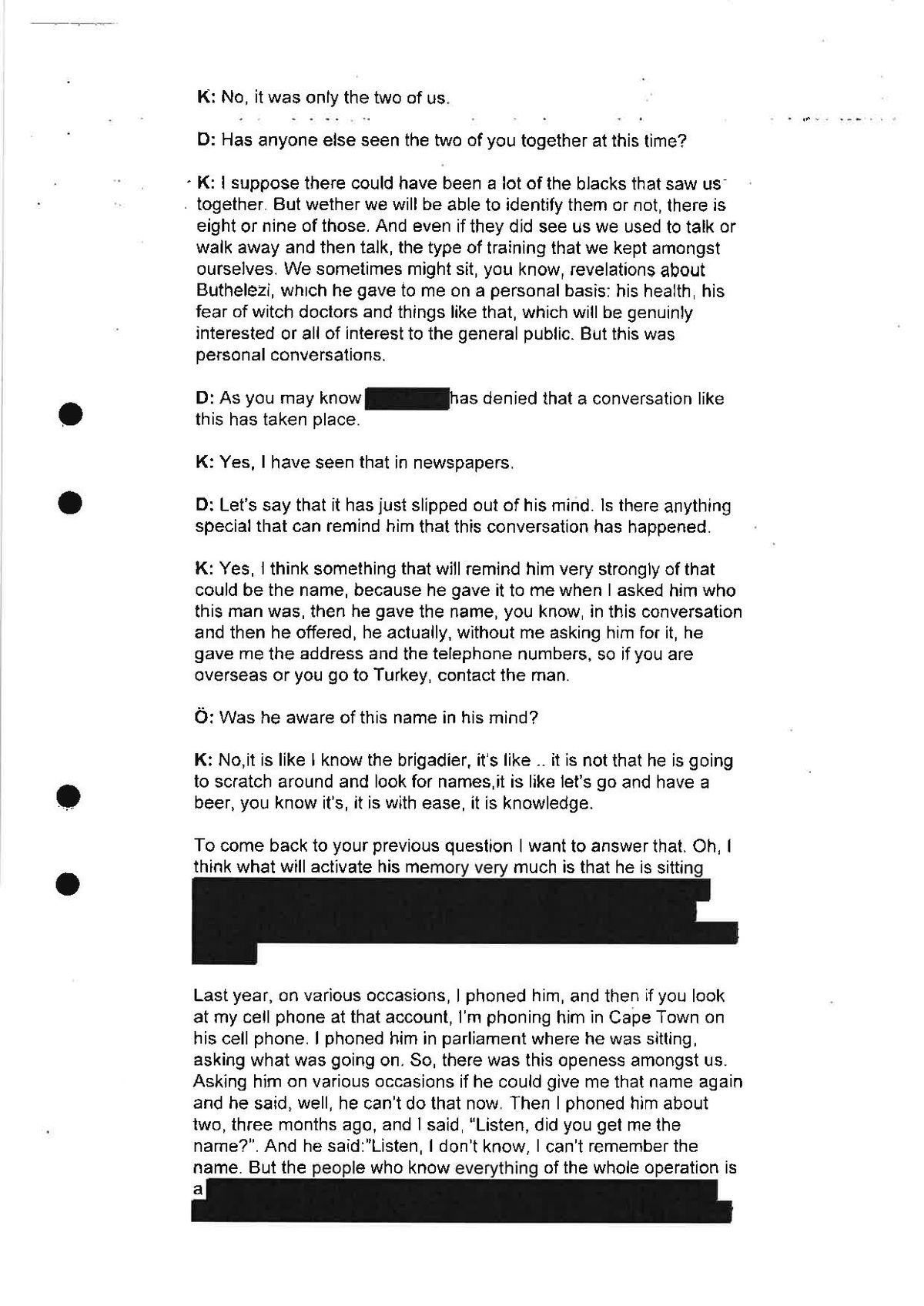
- - 6 (12) -
Eugene de Kock: No, it was only the two of us.
ÅKL Jan Danielsson: Has anyone else seen the two of you together at this time?
Eugene de Kock: I suppose there could have been a lot of the blacks that saw us together. But wether we will be able to identify them or not, there is eight or nine of those.
And even if they did see us we used to talk or walk away and then talk, the type of training that we kept amongst ourselves.
We sometimes might sit, you know, revelations about Buthelezi, which he gave to me on a personal basis: his health, his fear of witch doctors and things like that, which will be genuinly interested or all of interest to the general public. But this was personal conversations.
ÅKL Jan Danielsson: As you may know Philip Powell has denied that a conversation like this has taken place.
Eugene de Kock: Yes, I have seen that in newspapers.
ÅKL Jan Danielsson: Let's say that it has just slipped out of his mind. Is there anything special that can remind him that this conversation has happened.
Eugene de Kock: Yes, I think something that will remind him very strongly of that could be the name, because he gave it to me when I asked him who this man was, then he gave the name, you know, in this conversation and then he offered, he actually, without me asking him for it, he gave me the address and the telephone numbers, so if you are overseas or you go to Turkey, contact the man.
FHL Hans Ölvebro: Was he aware of this name in his mind?
Eugene de Kock: No, it is like I know the brigadier, it's like .. it is not that he is going to scratch around and look for names, it is like let's go and have a beer, you know it's, it is with ease, it is knowledge.
To come back to your previous question I want to answer that Oh, I think what will activate his memory very much is that he is sitting Helt stycke maskerat
Last year, on various occasions, I phoned him, and then if you look at my cell phone at that account, I'm phoning him in Cape Town on his cell phone.
I phoned him in parliament where he was sitting, asking what was going on. So, there was this openness amongst us.
Asking him on various occasions if he could give me that name again and he said, well, he can't do that now.
Then I phoned him about two, three months ago, and I said,
- "Listen, did you get me the name?"
And he said:
- "Listen, I don't know, I can't remember the name. But the people who know everything of the whole operation is a Helt stycke maskerat
- - 7 (12) -
ÅKL Jan Danielsson: Helt stycke maskerat
Eugene de Kock: Helt stycke maskerat
ÅKL Jan Danielsson: Did he mention anything more about this person than his name and address, for instance, age, family situation?
Eugene de Kock: No, he did not. If he did you will find it in the notes also. I made as comprehenive notes as possible, except for how long we sat, how long we talked, but there was no mentioning about family.
Usually when we talk in my own unit we never mention family, children or whatever. It was only men's talk.
ÅKL Jan Danielsson: I am not quite sure that I understood. Did Philip Powell mention how he had this knowledge himself?
Eugene de Kock: He worked for one of this frank? (front) companies of Craig Williamson.
ÅKL Jan Danielsson: But he did not refer to any other person?
Eugene de Kock: He didn't refer that he was involved in this operation, which is not impossible.
He was in a frank (front) company, which fell on the Longreach and International Freedom Foundation umbrella. And that is how he gained his knowledge, so it is not impossible that he was involved in the operations himself, that is not beyond that.
The Stratcom unit here, the Strategic Communication Unit here, would never execute, well axe like that, but they would plan them. And they would say, listen, we have a target, this is the target, can you go ahead and execute the target.
So I will not be surprised if he has more personal internal knowledge of this whole matter. I know that he denies it, but he knows that I know that he is lying, and he knows, and it like, he knew this man on a very personal basis.
It is not that he had to look for a name. He didn't have to look in his notebook. He did have a notebook of some sort, I can not give a description of it. The name he gave to me and the address and telephone number he gave to me out of the notebook.
FHL Hans Ölvebro: If we can go on and you tell us about the information you have from Tommy Lindström
Eugene de Kock: That is not much. He asked a lot of questions. I gave him a lot less than he ........... I think if you show him your notes that is basically what we gave him.
In the beginning I was quite impressed, I felt that this was a, that he was a real thing, but eventually he was too quiet for an interrogator in any case and he actually adviced us to keep certain things back.
Why I don't know because that is not usually for
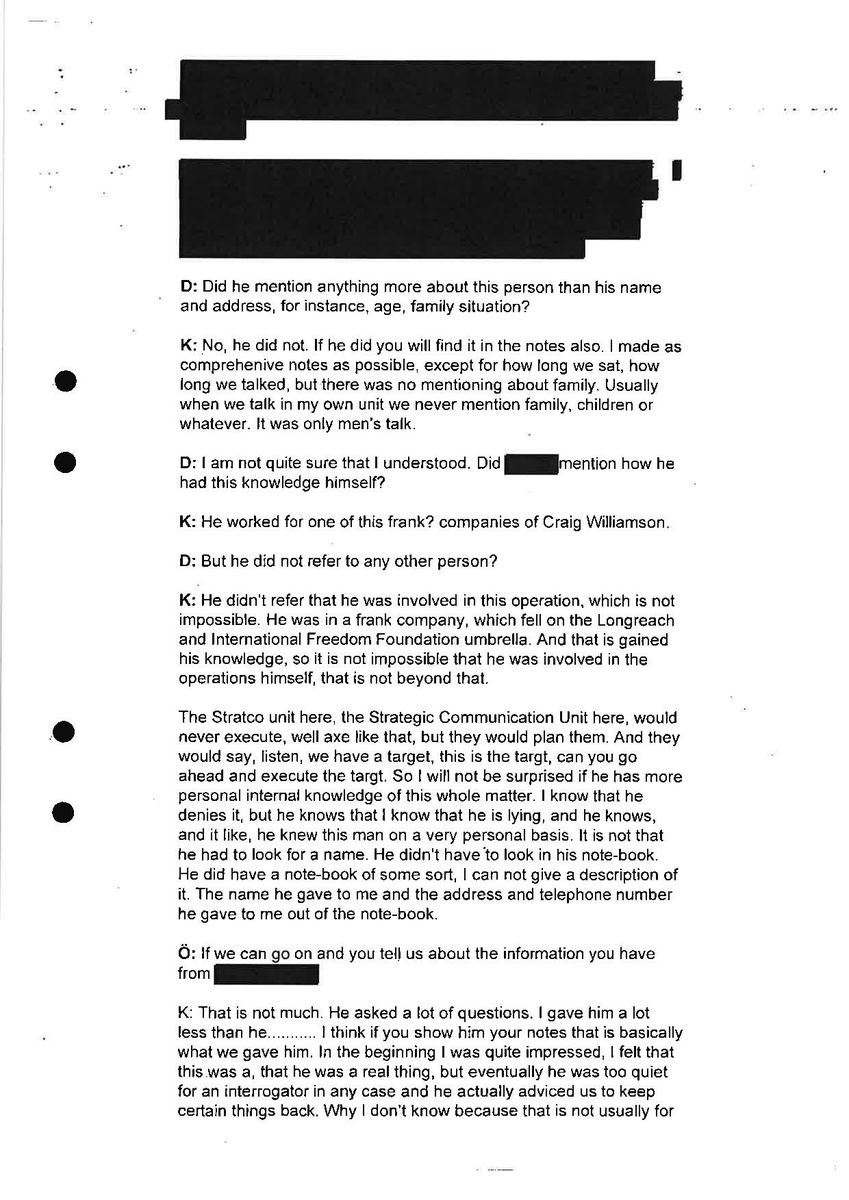
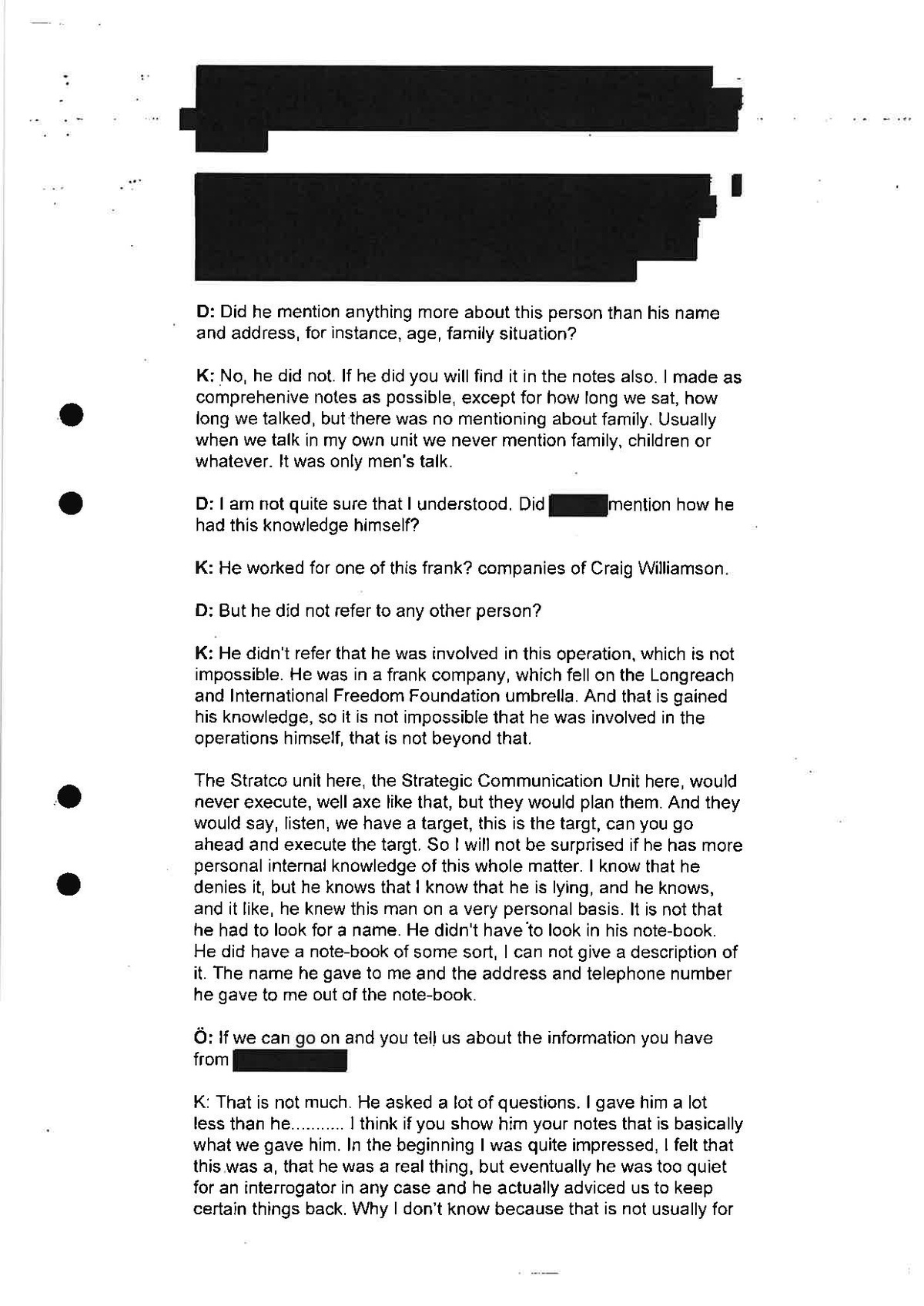
- - 7 (12) -
ÅKL Jan Danielsson: Helt stycke maskerat
Eugene de Kock: Helt stycke maskerat
ÅKL Jan Danielsson: Did he mention anything more about this person than his name and address, for instance, age, family situation?
Eugene de Kock: No, he did not. If he did you will find it in the notes also. I made as comprehenive notes as possible, except for how long we sat, how long we talked, but there was no mentioning about family.
Usually when we talk in my own unit we never mention family, children or whatever. It was only men's talk.
ÅKL Jan Danielsson: I am not quite sure that I understood. Did Philip Powell mention how he had this knowledge himself?
Eugene de Kock: He worked for one of this frank? (front) companies of Craig Williamson.
ÅKL Jan Danielsson: But he did not refer to any other person?
Eugene de Kock: He didn't refer that he was involved in this operation, which is not impossible.
He was in a frank (front) company, which fell on the Longreach and International Freedom Foundation umbrella. And that is how he gained his knowledge, so it is not impossible that he was involved in the operations himself, that is not beyond that.
The Stratcom unit here, the Strategic Communication Unit here, would never execute, well axe like that, but they would plan them. And they would say, listen, we have a target, this is the target, can you go ahead and execute the target.
So I will not be surprised if he has more personal internal knowledge of this whole matter. I know that he denies it, but he knows that I know that he is lying, and he knows, and it like, he knew this man on a very personal basis.
It is not that he had to look for a name. He didn't have to look in his notebook. He did have a notebook of some sort, I can not give a description of it. The name he gave to me and the address and telephone number he gave to me out of the notebook.
FHL Hans Ölvebro: If we can go on and you tell us about the information you have from Tommy Lindström
Eugene de Kock: That is not much. He asked a lot of questions. I gave him a lot less than he ........... I think if you show him your notes that is basically what we gave him.
In the beginning I was quite impressed, I felt that this was a, that he was a real thing, but eventually he was too quiet for an interrogator in any case and he actually adviced us to keep certain things back.
Why I don't know because that is not usually for
- - 8 (12) -
Eugene de Kock: an interrogator.
Usually they want everything. I made a short list of the information he gave us, because I didn't know what the calibre of firearm was at the type: He said it was a revolver 357 Magnum or 375 Magnum.
I didn't know how many shots was fired. I asked him and he said there was one shot fired at the minister and one at his wife. I don't know if it was like that.
I don't know, he said he was walking and it was at night.
He said that the minister's wife saw the face of the shooter. I didn't advise him that the safety of the wife should be upgraded, to point it strenously, because she will be in a position to identify the shooter, that be the truth what he told me.
He asked me why a revolver was used and why that type of caliber and then why do I think only one shot was fired. I think that that is about all. Is there anything else?
Ah, ja, then he asked me what with the price of such a shooting be and I said I never keep ("kill" ?) people for the market so I don't (know) what the price is for a president, a king or a minister.
What I do know in intelligence work then, there is nobody that is going to come otherwise, because not even the Russians touch them. There's an absolut taboo on shooting kings, presidents, ministers.
.
There is a taboo on doing that.
Agents will get stuck into each other, organisations will get stuck into each other. But you don't never touch ministers and presidents, except if, you know, further up north in Africa.
FHL Hans Ölvebro: What's your opinion about using this kind of a weapon?
Eugene de Kock: Well, I would suggest that you also ask him for his notes, so that he can give it to you.
This type of weapon, a revolver, doesn't throw out shells, so there is no chance to pick up for ballistic purposes.
Secondly, a revolver never jams, you have six shots. Personally my jam? You have a bad magazine you have a bad feeling.
The type of caliber is the second most powerful handgun in the world, except for that other 44 Magnum, automat. The .357 is, as far as I am concerned, the second most powerful. There are various types of ammunition .... and the power.
I can't say if these people, you know, loaded, ja, their own ammunition, using outlaws or whatever.
And I don't know what typ of revolver they used, but at a very short range, firing directly to a person, you will have massive trauma and you will have massive hemmorage.
If you hit them in arm you will take them down, you can (take) the arm off. The same with a leg. It depends of the angle and if you hit any of the bone.
If you only hit tissue you might have a lot of a trauma and damage to the surrounding tissue etc.
But a hit shot, a ...... shot, a stomach shot usually at all stages could be fatal, all would be fatal.
I don't know why, if he fired a shot at the man's wife, I don't know, if he ("it" ?) was a good shot, if he was in real an assassin, why miss her, maybe she wasn't on the agenda, so he kept the orders.
Maybe he was not assigned to fire a further shot.
Usually, if you go and you look at all your old pu..tures? (pictures) and we also hated it and snipers don't
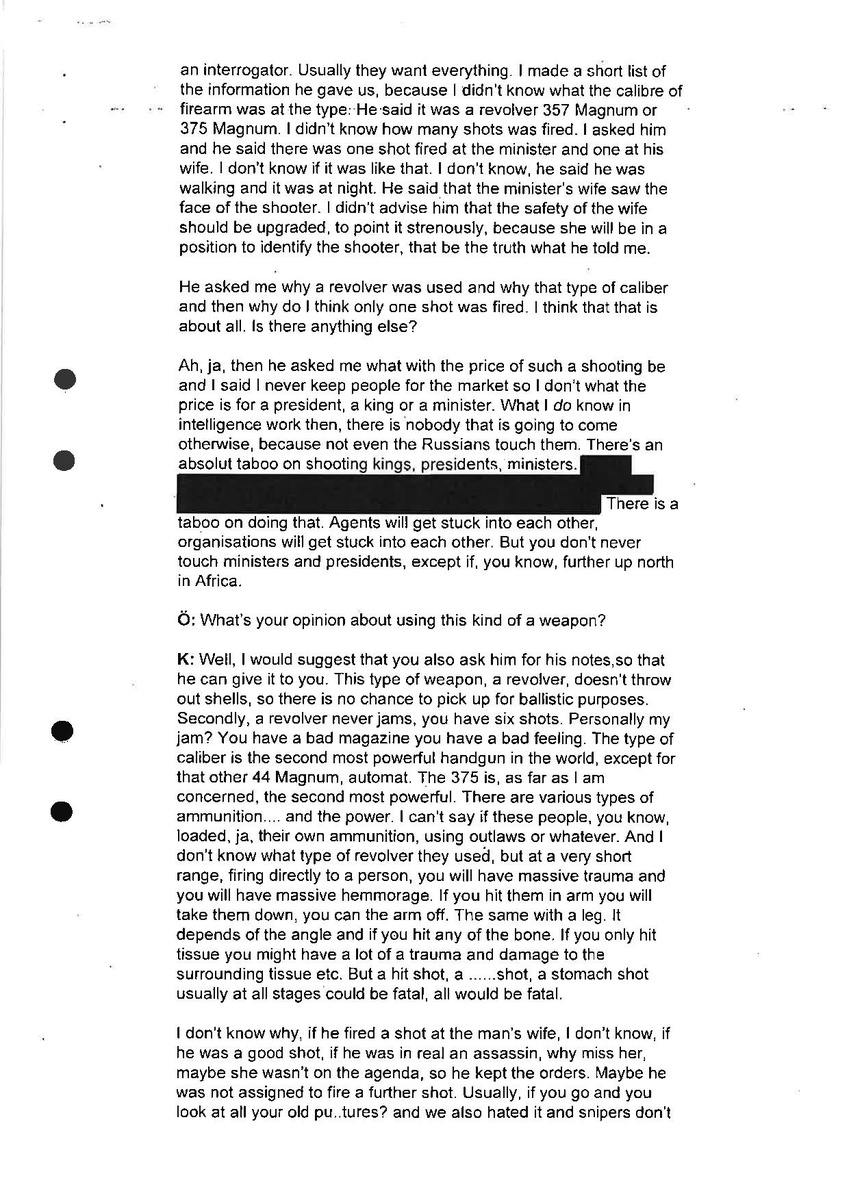
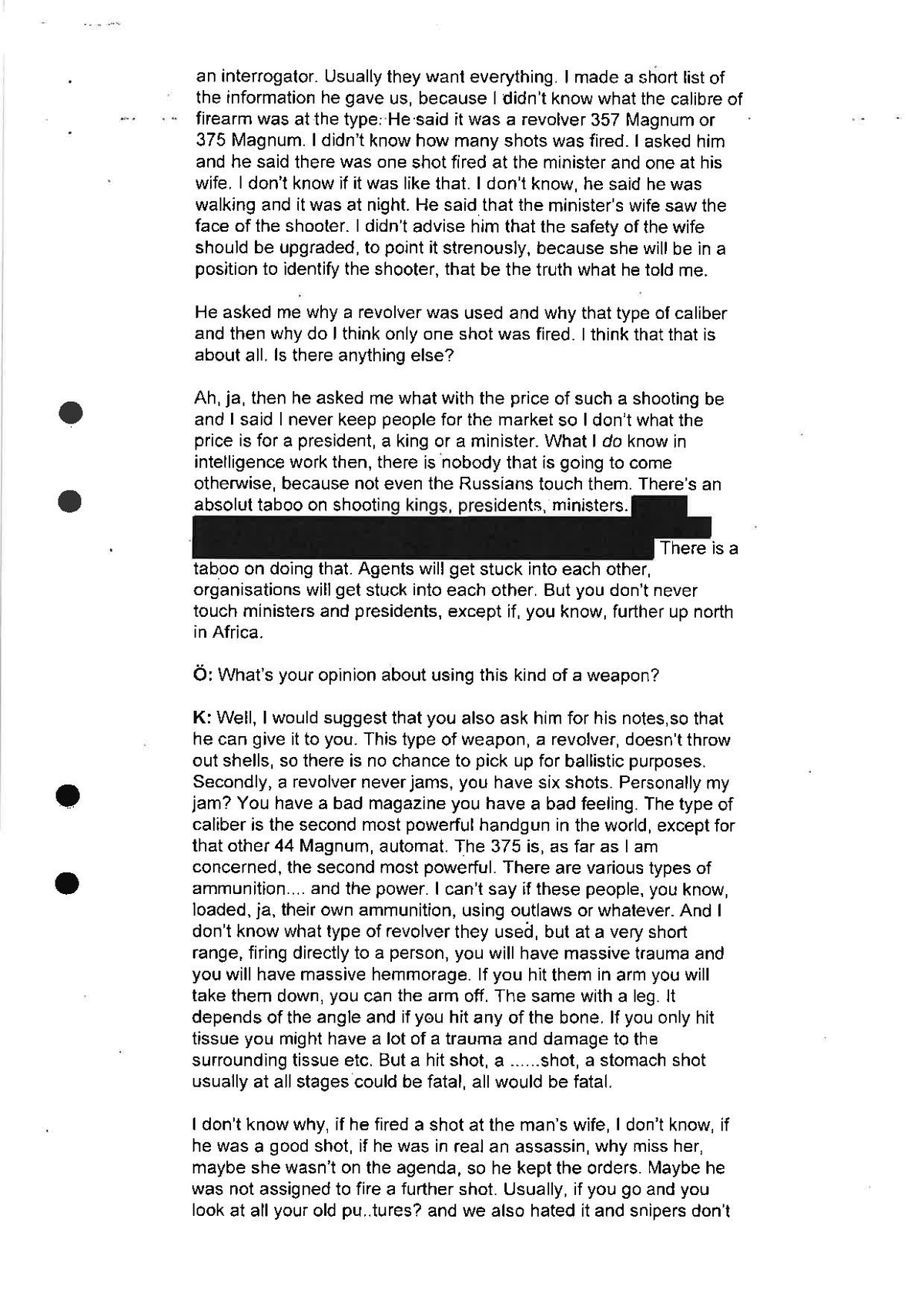
- - 8 (12) -
Eugene de Kock: an interrogator.
Usually they want everything. I made a short list of the information he gave us, because I didn't know what the calibre of firearm was at the type: He said it was a revolver 357 Magnum or 375 Magnum.
I didn't know how many shots was fired. I asked him and he said there was one shot fired at the minister and one at his wife. I don't know if it was like that.
I don't know, he said he was walking and it was at night.
He said that the minister's wife saw the face of the shooter. I didn't advise him that the safety of the wife should be upgraded, to point it strenously, because she will be in a position to identify the shooter, that be the truth what he told me.
He asked me why a revolver was used and why that type of caliber and then why do I think only one shot was fired. I think that that is about all. Is there anything else?
Ah, ja, then he asked me what with the price of such a shooting be and I said I never keep ("kill" ?) people for the market so I don't (know) what the price is for a president, a king or a minister.
What I do know in intelligence work then, there is nobody that is going to come otherwise, because not even the Russians touch them. There's an absolut taboo on shooting kings, presidents, ministers.
.
There is a taboo on doing that.
Agents will get stuck into each other, organisations will get stuck into each other. But you don't never touch ministers and presidents, except if, you know, further up north in Africa.
FHL Hans Ölvebro: What's your opinion about using this kind of a weapon?
Eugene de Kock: Well, I would suggest that you also ask him for his notes, so that he can give it to you.
This type of weapon, a revolver, doesn't throw out shells, so there is no chance to pick up for ballistic purposes.
Secondly, a revolver never jams, you have six shots. Personally my jam? You have a bad magazine you have a bad feeling.
The type of caliber is the second most powerful handgun in the world, except for that other 44 Magnum, automat. The .357 is, as far as I am concerned, the second most powerful. There are various types of ammunition .... and the power.
I can't say if these people, you know, loaded, ja, their own ammunition, using outlaws or whatever.
And I don't know what typ of revolver they used, but at a very short range, firing directly to a person, you will have massive trauma and you will have massive hemmorage.
If you hit them in arm you will take them down, you can (take) the arm off. The same with a leg. It depends of the angle and if you hit any of the bone.
If you only hit tissue you might have a lot of a trauma and damage to the surrounding tissue etc.
But a hit shot, a ...... shot, a stomach shot usually at all stages could be fatal, all would be fatal.
I don't know why, if he fired a shot at the man's wife, I don't know, if he ("it" ?) was a good shot, if he was in real an assassin, why miss her, maybe she wasn't on the agenda, so he kept the orders.
Maybe he was not assigned to fire a further shot.
Usually, if you go and you look at all your old pu..tures? (pictures) and we also hated it and snipers don't
- - 9 (12) -
Eugene de Kock: do it. You never fire a shot.
Because your first shot usually, people will get a general direction, 180 degrees. Your second shot ... give you a more of a line of direction; where it is coming from.
It depends, that happens, you know, in streets, there's a lot of people, one shot might have people look around, the second shot they know the man who is firing. That is my own opinion. I am also talking from experience, I got a lot.
Short paus
ÅKL Jan Danielsson: I would like to come back to your conversation with Philip Powell . As I noted Philip Powell told you about this man, his name and address and stated that he was a Swedish intelligence officer with a rank of captain.
Eugene de Kock: Former, a former Swedish intelligence officer.
ÅKL Jan Danielsson: He said so, as I understood you; in the event you would go to Turkey and wanted to look him up.
Eugene de Kock: Well, he knew that I was travelling overseas quite a lot. And he said if you go to Turkey or you want to meet the man, or you need the man, you know, here's his address.
ÅKL Jan Danielsson: In my view it would then have been normal, if he had told you, for instance, his age, his fitness, his capacity.
Eugene de Kock: If I'd asked, because I don't know about other intelligence services, but you do not go and ask people out. If a man does not volonteer information like that, you don't ask more, you don't question about ...
ÅKL Jan Danielsson: Yes, but he told you this with a purpose that you may want to look him up in person in Turkey. It would have been normal if he had told you how you could recognise him and use him.
Eugene de Kock: No, not specifically because that wouldn't have might, ah .., that is actually not important.
You could use a child of sixteen or you could use a man of sixty years old. It depends what you want done. And it depends on the previous experience of this man.
The age has got nothing to do with it. Infirmative might be, yes, but age has got nothing with the ability for a man to kill, whether it is a doctor, a minister or a priest or whatever. Age has never been a problem.
People likes to linger to age. Age has got nothing to do with it. What old operators do is to compensate for age and they change their habits in whatever operations they will do. They will still succed but they will change their habits. They will rather go for long distance fore exposures where before they would have ... to end or with a knife or a pistol.
ÅKL Jan Danielsson: What I was asking for was rather if he gave you some sort of information, which make it possible for you to identify the person, such as age, hair colour, teeth, length.
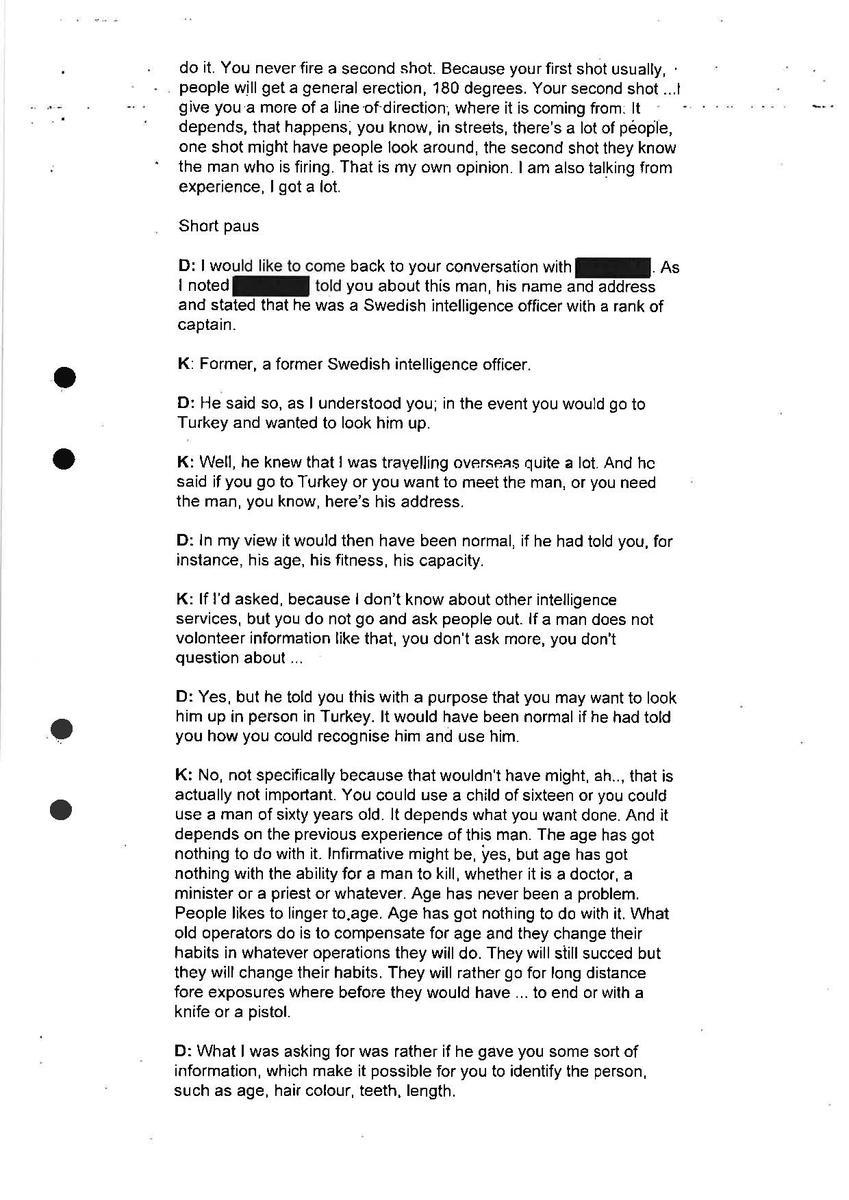
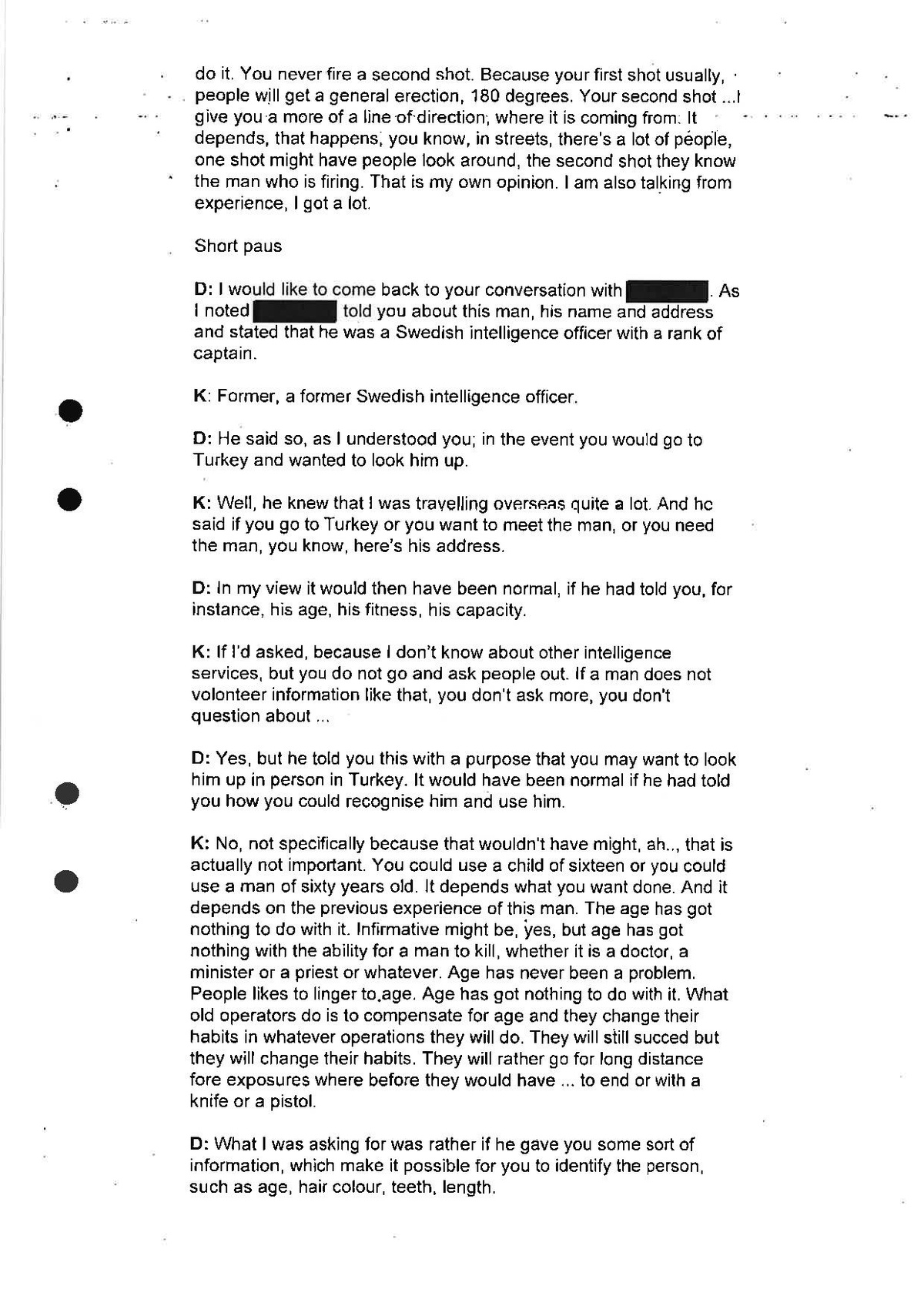
- - 9 (12) -
Eugene de Kock: do it. You never fire a shot.
Because your first shot usually, people will get a general direction, 180 degrees. Your second shot ... give you a more of a line of direction; where it is coming from.
It depends, that happens, you know, in streets, there's a lot of people, one shot might have people look around, the second shot they know the man who is firing. That is my own opinion. I am also talking from experience, I got a lot.
Short paus
ÅKL Jan Danielsson: I would like to come back to your conversation with Philip Powell . As I noted Philip Powell told you about this man, his name and address and stated that he was a Swedish intelligence officer with a rank of captain.
Eugene de Kock: Former, a former Swedish intelligence officer.
ÅKL Jan Danielsson: He said so, as I understood you; in the event you would go to Turkey and wanted to look him up.
Eugene de Kock: Well, he knew that I was travelling overseas quite a lot. And he said if you go to Turkey or you want to meet the man, or you need the man, you know, here's his address.
ÅKL Jan Danielsson: In my view it would then have been normal, if he had told you, for instance, his age, his fitness, his capacity.
Eugene de Kock: If I'd asked, because I don't know about other intelligence services, but you do not go and ask people out. If a man does not volonteer information like that, you don't ask more, you don't question about ...
ÅKL Jan Danielsson: Yes, but he told you this with a purpose that you may want to look him up in person in Turkey. It would have been normal if he had told you how you could recognise him and use him.
Eugene de Kock: No, not specifically because that wouldn't have might, ah .., that is actually not important.
You could use a child of sixteen or you could use a man of sixty years old. It depends what you want done. And it depends on the previous experience of this man.
The age has got nothing to do with it. Infirmative might be, yes, but age has got nothing with the ability for a man to kill, whether it is a doctor, a minister or a priest or whatever. Age has never been a problem.
People likes to linger to age. Age has got nothing to do with it. What old operators do is to compensate for age and they change their habits in whatever operations they will do. They will still succed but they will change their habits. They will rather go for long distance fore exposures where before they would have ... to end or with a knife or a pistol.
ÅKL Jan Danielsson: What I was asking for was rather if he gave you some sort of information, which make it possible for you to identify the person, such as age, hair colour, teeth, length.






